#Why are the protagonists’ character arcs a circle
Explore tagged Tumblr posts
Text
(Looking at White Collar)

#rambling#this isn’t about Neal it’s about the show in general#Why are the protagonists’ character arcs a circle#This is also about the white collar x leverage crossover fic that lives rent free in my brain
2 notes
·
View notes
Text
Aziraphale and Crowley's unhinged character analyzis (pt1)
Controversial opinion:
Aziraphale and Crowley at the end of Season2 managed to accomplish the main goal they each had since the beginning of time. Only to realize that what they wanted no longer made them happy.
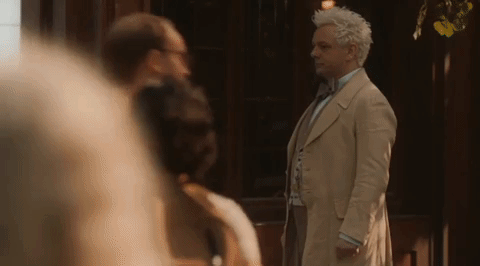
It sounds crazy, but to explain myself I have to do an in-depth analysis of their personalities and the possible transformation arc that both characters are probably going to have at the end of the Good Omens story.
Disclaimer: I have no idea about what is going to happen in Good Omens. This analysis could clearly be considered a theory since I'm not Neil Gaiman, but as someone who knows about narrative and character structure, I'm going to elaborate. Also, English is not my first language, so sorry in advance.
Aziraphale
First let's talk about Aziraphale. For two reasons, firstly because he is the one who seems to deserve the most defense right now; and second because Aziraphale, in my opinion, is the main character of Good Omens. This is because Aziraphale, out of the two, is the one who is likely to have the biggest change in his personality once his arc ends.
In a story, especially one like Good Omens with many characters, it is common for there to be many arcs, as every character has something to learn. Crowley, as a co-protagonist and love interest, is clearly going to have a change at the end of the plot, but his change won't be as big as our angel's.

First things first, what is a transformation arc?
It is the transformation that a character undergoes from the beginning to the end of the story. Basically, at the beginning of a story, a character is in a certain state of equilibrium, he lives and thinks in a certain way until he is exposed to a situation that forces him to act outside of his comfort zone. During this, he will undergo different changes that will be reflected in actions that take him away from his natural state until the climax, where the character will make a decision that will change his normality forever. This is important. In every story, the climax marks a before and after in the protagonist's life: whatever he decides at this moment has no turning back and will mark his life forever, so that after the climax, the character may again have a state of equilibrium but different from the initial one.
What is the climax of Good Omens? Well, in the 1st season we have the bodie swap and in the second season the separation of Crowley and Aziraphale. But of the story itself? It's still a mystery.
Neil Gaiman has already confirmed that Good Omens is a three-act story, so its climax will be located at the end of season 3. We still don't know what definitive change there will be in our characters… although throughout the series we have enough clues to at least know what they probably have to work on changing.
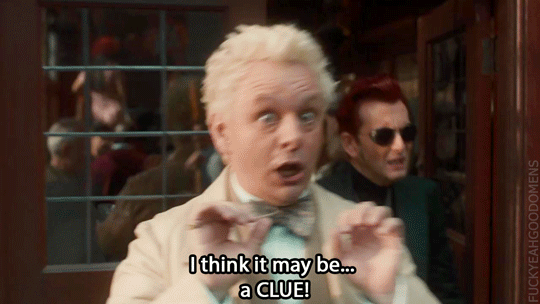
Aziraphale's Role
In order to analyze Aziraphale we must begin by understanding his role within the angelic hierarchy. Aziraphale was created as a Cherub and then, after Eden, became a Principality. Both ranks have one thing in common: they are guardian roles.
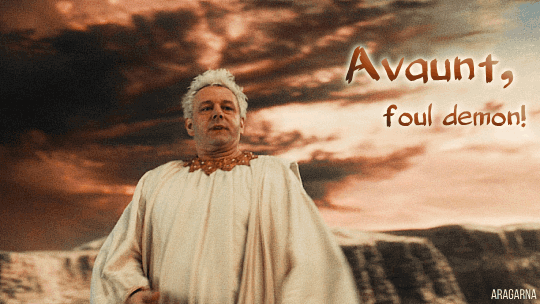
Cherubs are second in the highest circle of heaven, below Seraphims. They are described as "guardians of the universe from a divine plane and without direct contact with humans, although they positively influence them". On the other hand, Principalities are seventh within the last circle of the angelic hierarchy, and the highest rank within it. They are the guardians of nations and countries, overseeing global events within politics and commerce.
So, Aziraphale was created with the main purpose of being only one thing: a soldier. His function is to obey and protect objects, places and beings. That is why he was the angel who received the sword of fire, his task was to protect Eden. But he also has a very strong sense of intrinsic goodness that has led him to make erratic decisions throughout history that question just how much he is willing to obey orders.
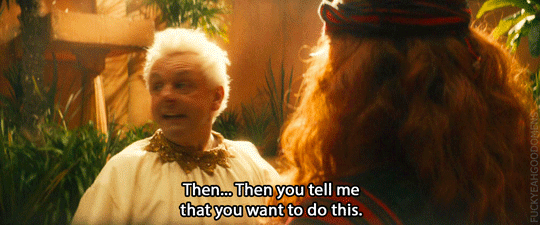
If Aziraphale feels that something is wrong, he won't do it. It doesn't matter if he has to go against Heaven or sin. It doesn't matter if killing a child saves the rest of the world, he won't do it. It doesn't matter if God will grant Job new children, he can't stand idly by. These actions make him stand out from the rest. A simple soldier just obeys while Aziraphale has a critical mind, he has too strong of an opinion about right and wrong. If an event happens that he considers evil, Aziraphale will go to great lengths to prevent it.
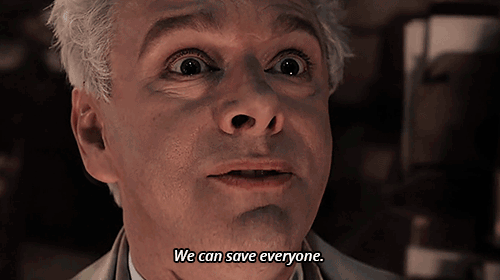
It is remarkable that the first thing he did having free will was to give his sword to Adam and Eve. Of course he did it with the function of protecting them but, by giving them his only weapon, Aziraphale was left in a serious state of vulnerability. He did it because he is good and kind, but it could also be considered an act of sacrifice. Here enters another important issue when talking about Aziraphale that relates to religion itself.
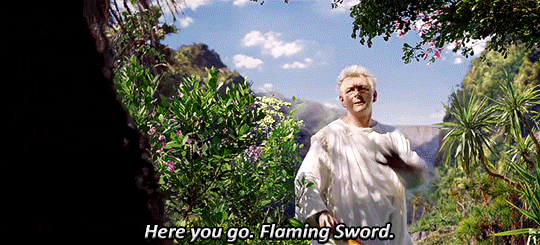
The Martyr Hero
One of the most basic conceptions about the Christianity is that without sacrifice a person cannot really be good. Jesus was crucified to free us from our sins; Job sacrificed his whole life to prove that his faith was genuine. Even centuries later, the ecclesiastical institution maintains that the more you suffer, the poorer you are, the more chances you have of ending up in Heaven.
All the sacrifices made in life will eventually be rewarded in the Kingdom of God. It is the eternal figure of the martyr that is worshipped in Church, the idea that to really love, to really do good, sacrifices must be made.

Aziraphale believes this blindly. Now, he is an angel, not a human. He will not have an eventual reward of any kind, and that does not matter to him, because he considers himself lucky to be able to be a being of light who brings happiness to others no matter the price he has to pay. He was willing to fall only to save the lives of Job's children just because it was the right thing to do.

Performing actions for your own happiness without thinking of the consequences is frowned upon throughout the Bible. It is considered selfish and is a great source of guilt for all its faithful.
There is a line from the Good Omens Musical that has always stayed with me. When they argue, Crowley tries to talk some sense into Aziraphale by claiming all the reasons why he should help him avoid Armageddon, to which Aziraphale replies "you and I are not important."
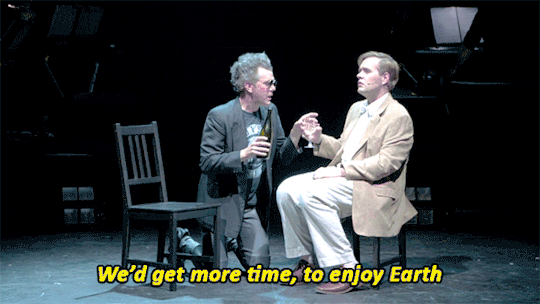
Why didn't Aziraphale quickly give in to the proposal to stop the end of the world? Why didn't he tell Crowley where the Antichrist was without hesitation? Why did he help Gabriel in spite of everything? Why didn't he kiss Crowley back although he wanted to?
Truth be told, Aziraphale does not prioritize his own happiness because he does not consider himself important.
At the center of it all is God, good and ineffable who would never let anything happen unless it is not amenable to the greater good, then there is all the rest. Aziraphale believes he is just a soldier with a mission: to protect the Earth and everything he considers worth saving. He is not on this list: his welfare does not matter to him because, in the grand order of things, Aziraphale does not believe he is important.
There is no afterlife reward for him, though that doesn't stop him from feeling guilty about wanting it.
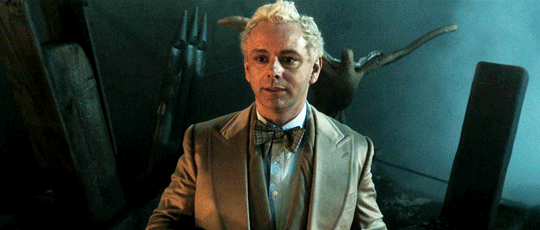
Aziraphale's dilemma
Aziraphale's great dilemma ould be summed up as:
Do I do what I want or do I do what I must?
Should he obey the rules or get what his heart yearns for now that it is within his grasp?

Throughout Good Omens, we learn Aziraphale has given into various temptations such as food. But these sins are small in comparison to what he really wants. For how does he explain to God that what his heart desires the most is to be able to love the Serpent of Eden?
He is madly in love with Crowley. He could lose everything: his bookstore, restaurants, music, art, but the feelings he has for him will never go away. It were years of repression, believing that if he loved him in silence, everything would be okay.
Now, in the season finale, Crowley expresses it, confesses and kisses him, offering him what he has always secretly wanted on a silver platter.

But Aziraphale was also offered a place in Heaven, finally being accepted by the family he misses. Aziraphale spent the entire 2nd season getting involved in trying to save Gabriel, in bringing Maggie and Nina together, getting perhaps a little too invested because he clearly missed having a purpose.

He was not well emotionally. He missed feeling that he does good because, despite everything, he believes in the potential that Heaven has. Aziraphale knows that if he is in charge, if he gives up everything that makes him happy, if he stops being selfish as he was all these years, he can make the necessary change to prevent the End of the World.
Aziraphale is a soldier whose main goal has always been to protect. Becoming the supreme Archangel he is able to protect everyone he loves. Because of this, he decides to sacrifice his earthly happiness and make the most difficult decision but the one he feels is right: to leave Earth, reject Crowley and become Head of Heaven.

The end of his arc and Crowley
Like any arc, Aziraphale's is clearly at the end of the story. He's already changed a lot, and he's done mostly so because of Crowley. Not just because of love, no, Crowley manages to awake something in him. Crowley is the driving force that encourages change in him, that reaffirms or questions his beliefs whenever he is in doubt about whether something is right or wrong. He inspires something that Aziraphale, an obedient soldier of the Lord never had: freedom.
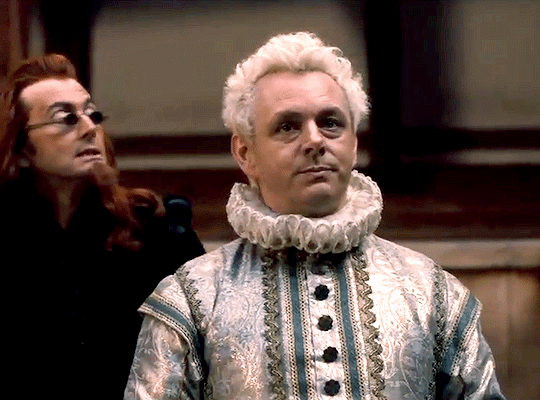
Obviously, our angel always had that spark of freedom, though repressed, hidden in the darkest part of his being because he knows it is something that makes him different from the rest and he doesn't like to admit that he doesn't fit in Heaven.
Because this means that he doesn't fit in Hell either, nor on Earth completely. Ergo, admitting to being different means confirming his suspicion that he doesn't fit in anywhere. But he never had to pretend this with Crowley.

Knowing all this, how will Aziraphale's arc end?
Well, he's going to have to choose between heart and duty again. Aziraphale is going to want to save Earth at the Second Coming, that's obvious. He is going to be forced to disobey Heaven once again as he realizes that he cannot change them. In this way, he will confirm something tragic: his sacrifice was in vain.
But it is necessary that he can assume this in order to understand that he is wrong:
It is not necessary to suffer in order to deserve love.
It is not necessary to sacrifice everything that makes you happy to prove you are good.
Eternal sacrifice is not the solution. Aziraphale has to learn that being happy and being loved is not a reward that has to be given, no, it is something he is worthy of without the need to sacrifice his life. Aziraphale must understand that he does not have to prove that he is a good person by martyrdom. He is a good person because he is empathetic, smart and sweet.

The secret is to find the balance between love and duty, between good and evil, to embrace his freedom and find happiness by accepting his mistakes that make him different from the rest. The easiest way is to learn to love in the most genuine way: the human way. Discovering that love does not necessarily have to be painful or repressed, that he can do it openly, that what he feels is not a test of faith, but the reward he has been waiting for all these years.
Aziraphale will ultimately become free through Crowley's love.
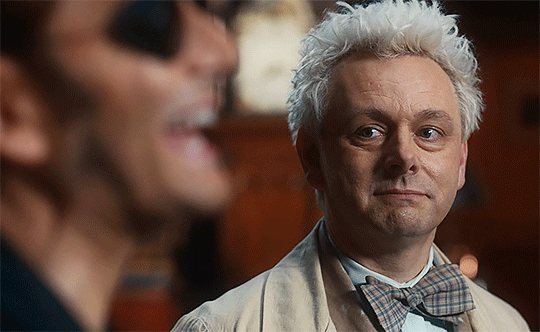
#stay tuned for crowley's analysis#some day i'll get over these two#but that day is not today#good omens#aziraphale#aziracrow#aziraphale and crowley#ineffable husbands#neil gaiman#character analysis#terry pratchett#crowley#good omens aziraphale#martyrs#transformation arc#good omens theory#amazon prime#give me s3 or give me death
635 notes
·
View notes
Text
What's 'Star Wars' about?
A while ago I got an 'Ask' that concluded with "what is Star Wars about, if not the Jedi, right?" And weirdly enough... I have to disagree.
I mean... to me? Yes. Star Wars is about the Jedi. A Jedi-less, Sith-less, lightsaber-less Star Wars movie or series will struggle to get me on board (which is why I was surprised that I loved Andor so much).
But if you read everything George Lucas said, if you think about the Jedi's place in his two trilogies... they're not front and center, right?
Sure, there's Luke Skywalker... but he's a learner, in the Original Trilogy. Same goes for Anakin Skywalker and Obi-Wan Kenobi, in the Prequels. They're going through character arcs.
Otherwise, the Jedi are either used as mentors to the protagonist...

... or to deliver exposition...
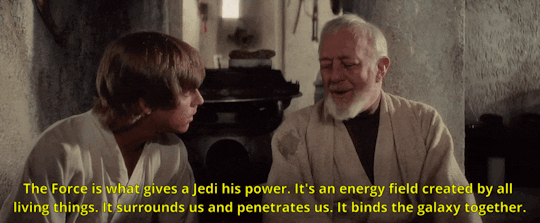
... but they're mostly vectors Lucas uses to present his thesis.
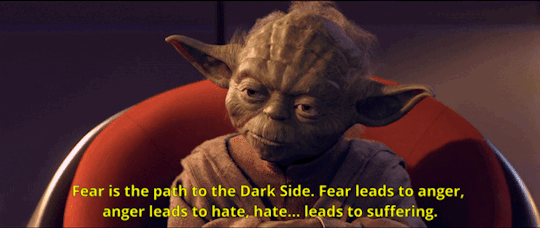
Functionally-speaking, the Jedi are important in that they embody the Buddhist philosophies the movie's themes are based on.
But when it comes to the plot, they're secondary. That's because the the themes of these films are bigger than the Jedi themselves.
So the question becomes... what's are the themes?

The primary goal of the Star Wars films is to inspire kids to start thinking outside the box and teach them a set of values and psychological motifs that have been passed down through mythology and fairy tales.
These values can be summed up in the dichotomy between greed and compassion / selfishness and selflessness / pleasure and joy.
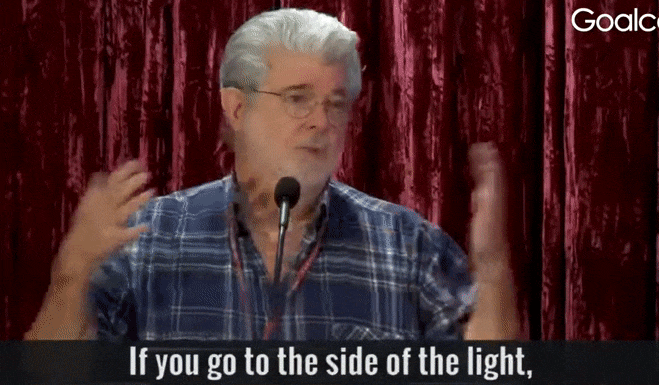

We all have both aspects and need to strike a balance between the two. After all, being greedy ultimately comes from fear and being afraid can happen to all of us. Problem is, unchecked fear can lead to anger, hate and a whole lot of suffering.
The more selfish you are, the more you want things and the more you're afraid that you'll lose everything you have, you'll get angry when someone tries to take it and that will hurt everyone around you.
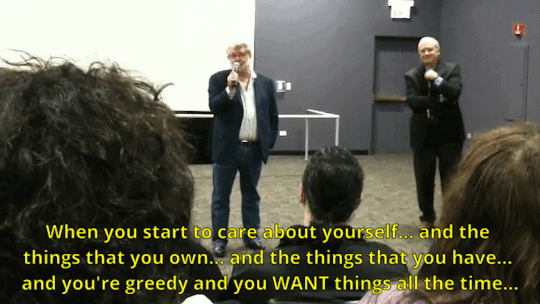
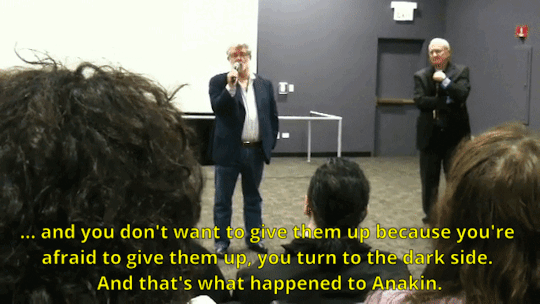
In other words, fear is the path to the tempting/addictive Dark Side.
Thus, seeing as we'll be inevitably tempted by the Dark Side and give in at some point (because nobody's perfect), we should aim to be as selfless and compassionate as possible for our own good... but also for the greater good, because we're all connected to a life energy. You can call it Qi or God; in Star Wars it's known as the Force.
As such, we all form a symbiotic circle and working with that in mind is better than putting ourselves first and draining from everything and everyone around us.
But we also need to be careful because there will be people who give in to that selfish side and will try to control everything. When the time comes, we must stand up for what's right.
So that's Lucas' thesis.
If I had to sum them up, the six movies illustrate it as follows:
The Prequel Trilogy is about the consequences of greed, explored through Anakin on a smaller scale and the Senate on a larger one.
The Original Trilogy shows the triumph of compassion, through Luke, Leia & Han and the Rebellion's fight against the Empire.

Lucas talked about it multiple times, the Prequels are about how Anakin becomes Darth Vader and how the Republic becomes the Empire, and in both those cases, it happens because they're greedy.
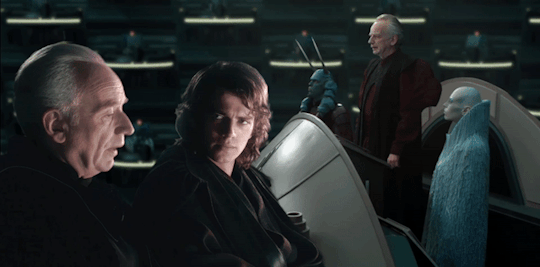
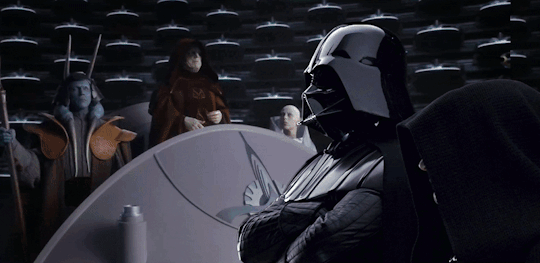
The Senate is greedy in the more classical sense. They could give a shit about "symbiosis", no they're taking bribes, letting corporations dictate policy, using loopholes to keep themselves in power and halting any meaningful progress out of fear that the new status quo will conflict with their own self-serving goals.
Anakin's greed manifests in a different way. He turns to the Dark Side because of his attachment. He wants to stop Padmé from dying... but not because he wants to save her, rather he wants to save himself from feeling the pain of loss again and will do anything to not have to live without her, her own wishes and the natural cycle of life and death be damned.
In both cases, they cave under pressure orchestrated by Palpatine, but nobody puts a gun to their head. They make a deliberate choice that comes from a selfish place, and neither one takes personal responsibility for it, they blame others, the Separatists in the case of the Senate and the Jedi in Anakin's case.
The Republic becomes an Empire with thunderous applause, betraying the people it was meant to protect.
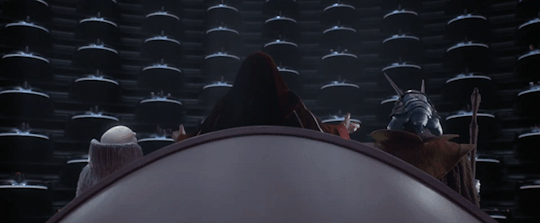
And when faced between doing something he knows is right and giving in to his selfish desires...
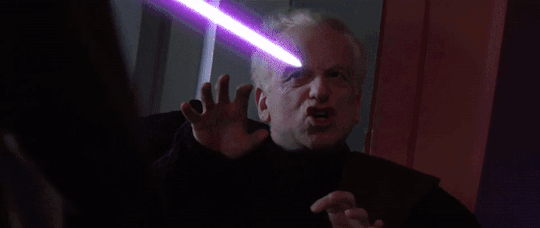
... Anakin elects to do the latter, thus betraying his family and leaving the Force in darkness.
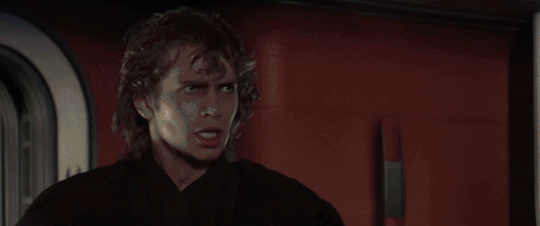
These selfish choices impact the galaxy as a whole, including the only characters in the trilogy who were doing their best to be compassionate and live in symbiosis: the Jedi, Padmé and Bail.
These champions of the Light Side are stuck playing catch-up or helplessly witnessing the events unfold, throughout the trilogy. They're playing by the rules and Palpatine uses this to his advantage.
Thus, as the galaxy tears itself apart because of Palpatine's manipulations, the Jedi and Bail are ignored and gradually weakened until they're either rendered irrelevant or killed.
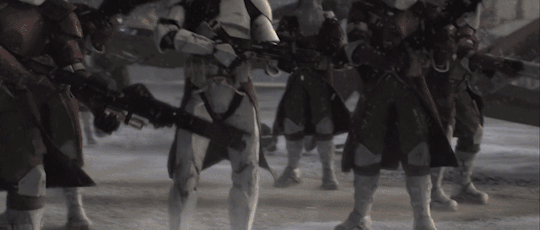
A new order is born, one built on blood, lies and greed: the Empire.
But a new hope remains.
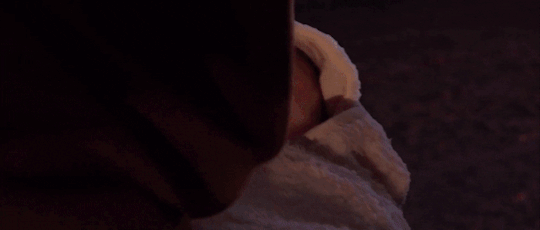

While before, the Jedi and people like Bail stood alone as everything around them became willfully corrupt... now, a Rebellion inspired by their legacy has banded together to overthrow the current order. But they don't fight for power or personal glory, they fight for altruistic, compassionate reasons. There's a sense of general responsibility that moves them, they're all doing their part.
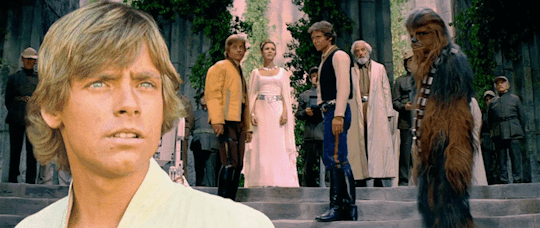
On a larger scale, we focus on the Rebels, who are tired of seeing people suffer and decided this needs to stop. They have gone from being passive, to proactive.
On a more personal scale, we see the evolution of Luke, from naive farmer to a hero, and guess what? More and more selfish people - like Han or Lando - are inspired to join the Rebellion, after seeing the exploits of Luke, Leia, or even Ben.
It all culminates in the final film, wherein:
The Rebels band together with the Ewoks - literal teddy bears whom the Empire, in their arrogance, never even considered to be a threat - to destroy the Second Death Star and free the galaxy from imperial tyranny.
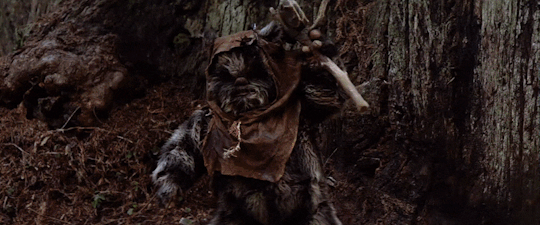
At the same time, Emperor Palpatine pressures Luke, who is tempted by the Dark Side like his father was.
But instead of giving in to his selfish desire to kill Darth Vader for all the horrors he's done...
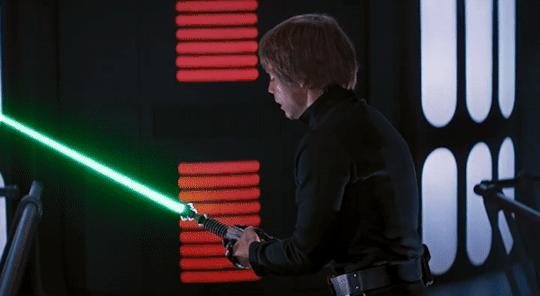
... he finds the strength to rise above it, instead showing compassion for his father, which, in turn, inspires Anakin to do the same.
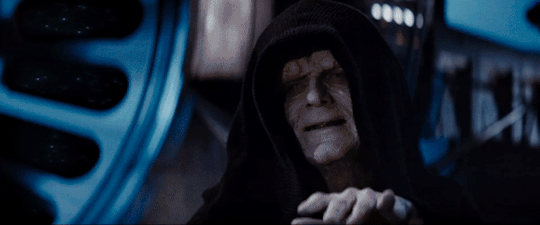
He faces a choice, like he did in Palpatine's office, two decades prior...
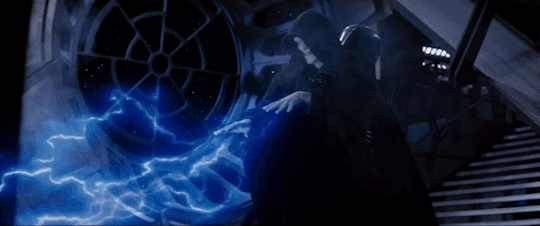
... and this time he chooses right.
Children teach you compassion. Anakin lets go of his fear and anger, and saves his son at the cost of his own life, finally bringing balance back to the Force.
Good triumphed over evil. Its champions achieved victory by being selfless, hopeful and fighting together / helping each other.


And that's it, that's how the movies thematically tie together.
As you can see, the Jedi aren't that directly impactful on the overall plot, because it revolves around Anakin, Luke and the respective factions/institutions around them.
But what the Jedi do bring to the table is their ability to teach and inspire others, both in-universe and out. They're spiritually impactful.
The Jedi are the epitome of compassion, and it's partially through them that George Lucas teaches his values to the audience.
#to be clear: Star Wars doesn't HAVE to be about all this#This is just me trying to summarize what Lucas said in all his interviews and speeches#The post-Lucas Star Wars transmedia franchise made the Jedi more central than they were originally meant to be; especially in the Prequels#You see this in interviews from current SW creators /writers#but also small stuff like renaming the Prequel era “Fall of the Jedi” when it was originally named the “Rise of the Empire” era#meta#george lucas#star wars#jedi order#the force#anakin skywalker#luke skywalker#prequel trilogy#original trilogy
720 notes
·
View notes
Text
option 1: tai’s guarding the crown of choice.
pros:
a legitimately important task that recontextualizes his ongoing decision to remain on patch as a personal sacrifice he makes for the greater good.
ozpin would pick the guy named for the god of light to be the gatekeeper of choice, huh.
if any parent in this story is meant to die, it’s him, and narratively this is the most intuitive way to do it.
cons:
realistically, what can tai do to prevent salem / cinder / summer from accessing the vault if they find it? if he’s the gatekeeper, staying on patch alone after everyone else evacuates achieves nothing except, ah, signaling to the enemy that the real vault is under signal academy. bad plan.
it means oz is breaking his promise to be honest and forthcoming, undermining his character growth for the sake of ‘surprising’ the audience with the most obvious answer.
means qrow has either been kept in the dark (see prev point) or he’s also deliberately hiding this information from his nieces after they asked him outright if he knew where tai is; this is so far afield for his character as to border on character assassination, and likewise undermines his positive growth since v7.
honestly makes both yang and ruby seem kind of stupid. they know the crown is hidden somewhere near beacon, that ozpin did something to protect it differently from the others, and that their father hasn’t left patch. ruby was sharp enough to guess that long memory might be a relic hidden in plain sight; yang is just as smart, and she knows tai had “some things” to look after on patch. are we expected to believe that “hey, is dad guarding the relic?” somehow hasn’t occurred to either of them?
tai harbors a whole lot of resentment toward ozpin, and based on qrow kicking him out of ruby’s bedroom to drip-feed her hints on where to go next, he seems to have been on the outer perimeter of the inner circle. why would oz entrust him with the relic’s safety?
glynda—ozpin’s scrupulously loyal second-in-command whose emblem is a crown and whose semblance puts her on par with a maiden—is a far more narratively plausible vault-guardian than tai, and the “sun dragon” makes a damn good red herring.
if he’s guarding the vault, he dies. sorry. but the point of putting the father of 2/4 protagonists in between the two main villains and the thing they want most (choice) is so they can kill him to get it, increasing tension and raising the emotional stakes of negotiating peace. to be clear, rwby is willing to Go There, but i think it’s an unsatisfactory way to close out the rose xiao long family arc.
option 2: survivors trapped under mountain glenn, and tai is taking point.
pros:
a genuinely important, worthwhile thing for him to be doing—even more so than guarding the crown. likely sets up a resolution for him in the vein of “you can be a good huntsman or a good father, and tai picked being a huntsman,” which is an elegant way to balance his contradictions.
gives him meaningful stuff to do in v10; for example, one stealthy huntsman with a bullhead could slip in and out of mountain glenn to get a few dozen people out at a time, and/or run supplies and messages between the kingdoms.
we get to see zwei back in action around mountain glenn :)
introduces a natural segue from playing defense in vacuo to mounting a counteroffensive against beacon as tai’s work clarifies the situation in vale.
easily the most 'heroic' direction for him without contorting the story to arbitrarily lionize tai: he’s a scout preparing the stage for the heroes to take the fight to salem, making him the good counterpart to watts.
cons:
makes no sense to keep it a secret. the emotional beats of B4 can still happen if the girls know this is what tai’s doing: instead of “do you… wonder why he’s not here? i know qrow said he’s on assignment, but what’s more important than here?” yang says “do you… wish he were here? with us? i know qrow said he’s looking for survivors, but how many of them can there really be by now? we need all the help we can get,” and ruby says “maybe we don’t have the full picture” as in maybe dad knows something we don’t and that’s why he hasn’t given up yet. the emotion is the same, and the big "they’re hiding in mountain glenn" reveal is hinted without spoiling.
leaves hanging the narrative thread of what tai has been doing since the fall of beacon, because the “some things” he was dealing with in v4 obviously wasn’t this.
option 3: tai is dead.
pros:
explains the apparent secrecy; qrow knows tai was away “on assignment” (i.e., had taken a huntsman contract that brought him out of the kingdom) at the time salem attacked vale, so he is missing but not yet presumed dead.
might reopen the mystery box of summer’s last mission through the real-deal “left on a mission and never came back” echo.
cons:
raven would know.
it’s a cheap, narratively unsatisfying twist that fails to deliver on the bread crumbs set up in v2-3 (tai starts going on missions again) and v4 (“some things”), and also undermines any serious emotional resolution with regard to yang and ruby’s complex relationships with tai.
option 4: summer’s working with salem, and tai is trying to convince her to come back.
pros:
“some things” being his presumed-dead wife who left him to join the enemy and with whom tai is now having an affair or otherwise hoping to coax back to the heroic side through the power of love whilst also keeping his mouth shut about her being a) still alive and b) a traitor is OBJECTIVELY the funniest answer.
brings forward and interrogates the way tai’s romantic grief informs the choices he makes as a parent: from hiding raven and then refusing to talk about her with yang, to shutting down when he lost summer and letting his five-year-old pick up the pieces, to discovering and then keeping summer’s secrets for the sake of some faint hope that she might finally come back to him.
cogent with the Dead (Absent) Mother / Neglectful Father / Evil Stepmother fairytale paradigm rwby deconstructs with raven, tai, and summer; the father chooses the stepmother over his children.
raises the emotional stakes of the war for summer through direct confrontation with the life she left behind, creating narrative opportunities to develop her character (is she still in love with tai? how does she feel about being his first priority, over their children? does she resent that he has her on this pedestal even now?) and apply pressure to her relationships with salem and cinder (do they know? is summer keeping her communication with him a secret, too? or is he an “asset” she’s using for salem’s benefit?).
consequently, raises the momentum of the narrative toward negotiation with salem; tai still has the coalition’s trust, however strained his personal relationships may be. summer is the obvious ambassador for salem’s side of the war, but she’s also the traitor who needs someone to vouch for her good intentions.
the secrecy needs no explanation: just as summer’s last mission was a summer secret, tai’s "assignment" is a taiyang secret and the girls know everything that oz and qrow do, because all of them have been left in the dark. raven might know, and she has the means to find if she doesn’t, but tai’s whereabouts are entangled with what raven knows about summer, so she can’t explain where tai is or why until she reveals her deep dark secrets about what happened between her and summer that night.
foreshadowing is solid: tai starts to go on "missions" again in v2, after the inner circle becomes aware that salem has infiltrated beacon and just before the breach downtown. when ruby visits summer’s grave in v3, she says "[dad] told me he’s going to be on some mission soon! i think he misses adventuring with you." he’s got to "look after some things" (but he isn’t talking about yang, because he stays home after she leaves). and then with B4 we have ruby echoing what the blacksmith taught her about summer in relation to tai, "maybe we don’t have the full picture?"
juicy
cons:
???
dependent on the unconfirmed theory that summer is working for salem as herself, not some unrecognizable enslaved monster, but i am as confident in that as i was about salem going to vale next and we all know how that turned out :)
taking their mom was not enough salem had to go for the full set APPARENTLY
option 5: secret fifth thing
pros:
???
cons:
???
87 notes
·
View notes
Text
One book draft that I am yet to circle back to was somewhere between being a YA novel and a book meant for older kids - essentially a fairytale for teenagers. Nothing particularly supernatural happens, but the worldbuilding is so vague and Based On Romantic Vibes that one couldn't really call it fantasy. The exact time or place of the land is never clarified, only that it's set in a port town in some era around the time of sail ships. Characters, for the most part, don't have first names, but are referred to by their roles or defining features - such as the Butcher, the Poet, the Tavernkeeper, and so on.
There's a scene where the protagonist and his best friend are sitting at the house of the Portmaster, who - just the night before - had to break apart a fist fight between two grown men. Or not really a fist fight, as much as a simple one-sided beat down - the Butcher, who is known as a gentle man (who had chosen his profession because Someone Has To Do It, and he would rather oversee that the work is done with the least amount of pain than have the animals killed by someone who doesn't care) had seen the Poet stumbling drunk out of the town's tavern, had gone into a terrible rage and started beating the shit out of the drunk Poet.
The Portmaster remarks that while he doesn't accept what the Butcher did, he understands that it was out of love. Everyone in the town knows everyone, and everyone knows the Poet had been drinking himself to death for the past fifteen years after a passing sailor broke his heart, and he had been sober for some time now. Seeing him drunk again threw the Butcher into rage out of fear and love. When kind, intelligent people do mad and cruel things, it's often out of fear and love. Stupid, but understandable.
The protagonist, who is 15, doesn't understand how and why the Portmaster can have sympathy for a man whose arrest he was personally involved in, when overseeing that people follow the law is literally his job. The portmaster explains that aye, he sees that people do things as the law dictates, but in his work he has learned that there's a difference between people who follow the law, and the people who are good people. Sometimes people who only want to do the right thing don't pay attention to laws, and some of the worst people that he has ever met have never broken a law in their lives. They know exactly what is the cruelest thing they are legally permitted to do, and would do worse if the law allowed.
The protagonist, being fifteen, doesn't really pay attention to the lives of the adults around him, and the story arcs of the side characters - such as the romance between the Butcher and the Poet - pass him by largely unnoticed. The Portmaster is a quiet, understated man, and the narration never goes into his backstory, no more than mentioning that he came into this land as a foreigner from somewhere far away, and that he came here alone. No-one ever asks why a good man like him seems to have no family at all, not to think of asking what happened to his family.
The only thing he will willingly say on the subject is that he is very familiar with just how cruel some people can be, when legally permitted to do so.
244 notes
·
View notes
Text
I do find it very interesting how differently Scar's and Roy's violence against Edward is viewed within the fandom (and partially the narrative).
There's two specific instances I am thinking of (some of the other happenstances of violence play into different dynamics better discussed at another time).
The first one is the legendary first encounter between Scar and Edward. He only finds them because some military employee uttered the name "Fullmetal" while the State Alchemist killer was prowling East City and he hunts them down the same he would have hunted down Roy or Armstrong or Grand Basque.

And then he almost kills Ed - because of what Ed stands for, no matter the fact that he's a child. By his own admission later in the series, Scar is blinded by hatred and vengeance at this point. It doesn't matter that Edward is fifteen. It doesn't matter that Edward never set foot into Ishval, or that Resembool was bombed during the war.
What matters is that Edward is a symbol in Scar's way.
The second instance is something less often discussed, but something just as - if not more - interesting to me.

Because this is the scene where a - wrath-stricken - Roy Mustang threatens to burn Edward should he not release the object of Roy's fury.
And it's not a funny scene. In the story we've just seen just what exactly Roy is capable off. We've seen him burn eyes and ears and tongues, we've seen him enjoy it. And blinded by his personal need for vengeance we see him threaten an ally (maybe even a friend) with severe bodily harm, maybe even death.
Just as Scar almost ninety chapters (49 episodes) earlier, Roy is willing to kill a child because he is blinded by hatred.
And it's fascinating to me. Because of course Scar and Roy are parallels to each other - at least in this part of the story. Throughout the entire story, both men circle Wrath - the humunculus, the Fuhrer, and their own fatal flaw. It is no coincidence that Roy is shown in direct contrast with Bradley during Ishval, just as it is no coincident that it is Scar who finally strikes him down with the help of some godly intervention.
Both Scar and Roy have to overcome their wrath specifically as part of their story arc to fulfill their character development. Which is why Scar is the only one who doesn't outright condemn Roy for wanting to torture Envy - he understands the need, just as Hawkeye understands that Envy has to die either way. He just also understands what this kind of fury does to a person, has witnessed firsthand how it almost cost him what little community he had left after the genocide - and how giving up on this all-consuming vengeance (without forgiving the Amestrian Government or even Roy for what they did) is what allowed him to build a new community and a new future for his people.
Which makes the timing of this scene - and the fact that in both examples it is Edward who almost falls victim to their punishing hands - so intriguing.
Because we meet Scar first. We meet him as an antagonist at the beginning of the story, and the first real impression we get of his mission is colored by Ed's limited worldview and our affection as the reader for the protagonist of this story. As such, Scar's violence against someone who bears no fault for the horrors he suffered seems unjustified and leaves a stronger impression.
By the time Roy snaps (after a long road of character development that seems very heroic but is always tinged with the thinly veiled truth that Roy is ready to snap at any given point) Scar has been an ally for more than 14 episodes. Scar has already found redemption in the eyes of our heroes by meeting Winry and finding closure.
Roy on the other hand has accompanied us, the reader, the viewer, as a cunning hero with a dark past. The charming, suave manipulator with a heart of gold. By the time he threatens to murder a child, THE CHILD even, we view him as our friend. We trust him.
As such it is easier to forgive him for what he almost did.
And I think that's fascinating. Because if we look at it bare-boned, there is little difference in what happened: they both almost killed/harmed Edward but ultimately didn't (they were both stopped), they were both driven by hatred and vengeance, they were both enacting "justified" revenge on the wrong target, they are both allies for a large part of the story, they are both driven by the same motive (revenge/Ishval) - and yet, it often seems as if Roy's attempted murder is forgotten, while Scar's dictates how half the fandom interacts with him.
Part of that is due to the placement of these scenes - it is Scar's introduction, and Roy's third act culmination of his character arc - but it is still something I think about.
Because it is integral for Roy's character (and the reason why everyone tried to stop him from torturing Envy further) to understand that he was willing to kill Edward so late in the game - just as it is integral to understanding Scar's character that he quickly abandoned his senseless hatred of Edward (though I doubt they would ever be friends) and instead is part of the group that stops Roy from enacting his revenge.
They mirror each other, and if anything, Roy is the one who had a character deterioration arc before he pulled it back around in the last minute.
Scar is a classical anti-hero, someone with a narratively linear path towards healing throughout the story. But just because Scar starts as an antagonist, doesn't mean that Roy was meant to be a true hero.
Both their vices is Wrath, only Roy faces his way later in the game. Only Scar embraced moving forward first.
#roy mustang#scar#edward elric#fma brotherhood#fmab#fullmetal alchemist#fullmetal alchemist brotherhood#fma meta#my stuff#i just have so many thoughts on scar and roy and wrath (and ling)#and this is part of it#i also have much thoughts on roy and violence#particular roys violence against ed#i also think#its weird how many people define scar by him trying to kill ed#when this guy was a traumatized genocide survivor#doing a bit of light indiscriminate revenge#and nobody focuses on the fact#that roy mustang was ready to burn his subordinate#of four years#over a worm#(yes i get how important hughes was for roy)#(and why this kind of negative character arc was actually really interesting)#(and clever of arakawa to pull with roy)#but like#scar will always have way more sympathies from yours truly#and i say this as a royai girlie
48 notes
·
View notes
Text
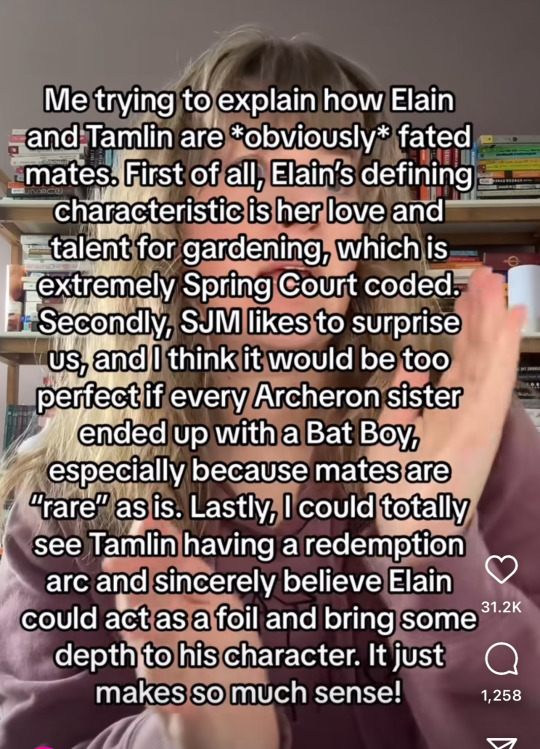

This again. I just want to break down my thoughts here so bear with me.
(I did the math and calculated ~ 7.9k people voted that 55%) 💀
First of all,
Elain doesn’t just enjoy gardening for the aesthetic, but rather for the fruits of her labor through hard work. Spring Court’s flowers and nature are only in bloom by magic (The High Lord’s). Not work. Not labor. But rather for convenience and aesthetics (to embody the very domain that one, being Tamlin, High Lord of the SC, resides in). That, to me, goes against Elain’s very enjoyment of the craft of her gardening.
Couple that with the fact that she has completely neglected using those gloves that Lucien gave her. She put them down after they were gifted to her, not even bothering to look at them as if she didn’t care for them. She doesn’t seek protection from the labor of her craft. She doesn’t want to make it easier. She enjoys the challenge. I think Feyre’s perspective on that made it clear.
And again, why would Elain in her right mind willingly go to be with her younger sister’s abusive ex? Why would she? I’m pretty sure she is well aware of what transpired between the two. That she is aware of Tamlin’s actions. Especially when he is partially, if not entirely, responsible for her life quite literally being turned upside down. Having her mortality stripped from her and her love and happiness (or simply content) gone along with it. If she is so visibly uncomfortable with Lucien, who was an accomplice, I’d imagine she would also hold animosity or discomfort for Tamlin tenfold.
Secondly,
Regarding mating bonds being rare: This is a story that encompasses a main group of protagonists. 3’s are SJM’s specialty. Just because 3 brothers may get with 3 sisters does not automatically mean that mating bonds aren’t rare. As a fae romance series with mating bonds clearly being a significant staple throughout, we will encounter mating bonds. Especially with our protagonists. That just seems like logic to me. Even then, it’s been stated and shown time and again that not every mating bond works or is positive. That just because two individuals have a bond doesn’t mean they’ll have good chemistry.
Also take into account that our dear Inner Circle is not the entire continent of Prythian. The Inner Circle does not equal the entire population. So therefore, a small group of mated individuals ≠ a common occurrence.
What’s wrong with the storyline matching up to have a 3:3? Is the perfectionism so wrong? I think that the phrase “too perfect” should be replaced with “complete/completion”. One last brother to one last sister is the remaining piece of the puzzle. Yes, you can argue that the cliche of 3:3 is boring or too simple but this is SJM’s world. She is a cliche author. She always has been.
Lastly,
I believe that Tamlin has had his redemption arc. If you want to call it that at least. In my opinion, he doesn’t need one. His prime arc is over. The series is way bigger than just Tamlin now. I simply see no reason as to why SJM should take more time for Tamlin , who arguably has done more than enough, rather than anything else. I feel like it’d be a backward progression.
Not every character has to be redeemed.
Not every character should be able to find peace or become good after selfish or morally questionable acts.
Not every character calls for major development.
To me, it’s just bad writing to redeem and develop every single character.
Even then, Tamlin is a well written character. He doesn’t need more depth. (I think this post alone proves that people don’t understand him already). He doesn’t need Elain to come in and “fix him”. No one can. No one but Tamlin himself. And we see that if anything, he’s wasting away rather than trying to help himself. He’s wallowing in his grief, anger, and hatred. Be it for others -like Rhys- or himself. It’s on him. Hell, even Rhys tried to help him. Yet he remains unmoving. That is Tamlin’s choice. Elain shouldn’t need to be his catalyst for change. He should.
To Conclude,
I see no logical reason again as to why people think this is a possibility. It just seems like a terrible writing choice for the story of ACOTAR. Of course, SJM can indeed surprise us. She wields the mighty pen after all. But then again, why would she turn around and completely dismiss 4 books of chemistry with a certain shadowsinger just to pitch our third sister with someone like Tamlin or Lucien? If she had planned to do so before, why would there be 4 books worth of obvious chemistry? It’d be a waste. If she has planned or plans to have Elain go with Lucien or Tamlin, why hasn’t she written any semblance of true chemistry between them? If Elain should allegedly have a balance with Tamlin or Lucien, why isn’t there any chemistry? All I’ve seen from Elain is obvious discomfort.
“I thought it was obvious…” - SJM
I could write more about Lucien and Elain’s dynamic but I think that is a whole different matter that doesn’t pertain to the current topic so I’ll leave this here. Thanks for coming to my ted talk.
#acotar#elain archeron#pro elain#tamlin#elriel#pro elriel#The math ain’t mathing here man#Let Elain stay in the NC where she WANTS to be#She owes Tamlin nothing#no one does#Let Elain garden in peace with Azriel by her side#a court of thorns and roses
76 notes
·
View notes
Text
The Owl House and Fullmetal Alchemist
So let’s talk about how The Owl House’s parallels to Fullmetal Alchemist, how it may or may not take inspiration in certain aspects, etc. Dana Terrace mentioned once that Luz would love Arakawa’s art, and even without the confirmation that Dana herself is familiar, it’s pretty clear…
(And yes, I’m discussing the 2003 continuity because why not; Depending on when she got into FMA, it might’ve been Dana’s first exposure to the series even!)
We have a magic system that can be accomplished two ways; Either by drawing circles with patterns, or by using your hands. In FMA, the former is the norm, the latter the exception; In TOH, it’s the other way around, with our main character Luz having to rely on glyphs.
Luz and the Elrics lost a parent, but they have one who’s still alive that they have mixed feelings with, but ultimately reconnect with near the end of the series. The loss of that first parent motivates them, it’s what leads to the inciting incident, with the Elrics trying to bring their mother Trisha back to life only to lose an arm, a leg, and a body; Luz carries on her father’s final gift, and in her attempts to be true to herself as Manny taught her, she ends up being sent to Reality Check camp, with her mother Camila agreeing due to not being as brave.
The permanence of death is something for characters to struggle with; Multiple characters in both versions of Fullmetal Alchemist attempt to revive the dead for this reason, or prolong their own lives by ending the lives of others. The closest attempt to reviving the dead is in 2003, in the ambiguity of its Homunculi, who may or may not be the souls their creators attempted to bring back; And at the end of the series, the main protagonist is killed. But his brother Alphonse recognizes that his soul hasn’t yet passed an established threshold existing on a separate plane of existence, and is able to sacrifice mythical power he’s gained to bring Edward back to life, at the cost of himself passing the threshold.


Similarly, Luz also dies at the end of the series to protect the Collector; But because her soul hasn’t yet passed the established threshold that exists on another plane of existence, the Titan is able to use his power to bring her back to life, even as he himself passes the threshold. Luz dies as a lesson to the Collector in the limitations of their own power; Edward’s tragic encounter with Nina reminds him that for all his boasting of alchemists as the closest thing to God, alchemists are still mere mortals with limitations, which is a major factor into his main antagonist’s motives.
The Collector’s childish naivete extends to their lack of familiarity with death, and they eventually have to come to terms with it and other consequences as part of their character arc. The Collector is the youngest sibling of the Archivists, who themselves have a petty relationship with death; They seek to preserve all living things eternally via scrolls, but this state destroys their physical bodies, preserving only their souls. Any population that doesn’t go along with their plans of preservation are wiped out by the Archivists in retaliation.
The Collector’s story can also be compared to Wrath the Homunculus from 2003; Both are immortal child antagonists who stand out thanks to their magic. Both are manipulated by Belos and 2003 Envy (guys who murder their blonde brothers via stabbing), and are isolated to do so. They feel anger over being mistreated by parents and older sibling (figures), but ultimately just want companionship.
They have bittersweet endings; The Collector goes off into space, but still occasionally visits his mortal friends; Wrath goes off on his own, but occasionally interacts with Winry, and finally sacrifices his life to help Alphonse reunite with his own beloved family member, as Wrath gets the same in death.
But for all of the mixed feelings about death, immortality may not be so pleasant either; King Clawthorne is doomed to outlive everyone except for the Collector and Hooty, which means so many loved ones dying before his eyes. This is a fate Hohenheim dreads regarding his wife and children, and he manages to avoid this when he sacrifices the power behind his immortality to save the world, and die a mortal whose age finally catches up to him. This might be why the immortal Archivists preserve mortals as scrolls, though their reaction to those who refuse them is suspect…


EDalyn Clawthorne, EDward Elric; They’re main protagonists, with a color scheme consisting primarily of dark red, with gold, black, and white. They’re teen prodigies, although both lose their magical abilities in order to protect a loved one who stars right alongside them as a fellow main character. This is never restored, and they also lose their right arms due to being part of a deadly spell. They’re quite (in)famous and have a sibling. Of course, Edward works for the state; Eda is devoutly against it, a proud criminal.
There’s a running theme of disability, with Eda’s disability coming from the curse, which eventually drains her magic. It leaves her fatigued, is implied to be messing with her memories, and causes her to age more quickly. It even makes her transform into an Owl Beast, due to the curse coming from Eda being possessed by one. When the curse completely overtakes Eda, Lilith takes on half of it to allow Eda to regain her usual form, but her and Lilith lose their magic forever. In the context of a society comprised of witches, Luz is essentially disabled, as is Hunter; For Luz, glyphs are her magical prosthetic, as is Flapjack the Palisman familiar for Hunter.
Edward lost his arm and leg, Alphonse lost his body. Izumi lost some of her organs and regularly suffers from fainting and exhaustion, as well as vomiting blood. Lan Fan loses her arm. Automail is aesthetically cool, but it’s also a hassle and requires a months-long process to get used to, and even then you need a mechanic to maintain it. Ed has to return to said mechanic, his childhood friend Winry, multiple times, and suffers from his prosthetic overheating or nearly giving him frostbite, depending on the temperature.
Disability sucks; And it’s something you just have to learn to live with, in Eda’s case. She accepts her curse, she’s not interested in her mother Gwen’s attempts to cure it, which just make her feel ashamed of the curse and lead to a breakup with her lover Raine. In 2003, we see a man who lost his leg but doesn’t use Automail to replace it, explaining to the Elrics his decision, and being validated and respected for it by the narrative.
Ed and Eda’s disabilities are connected to a magical incident involving another being they constantly live with; This being lost their body, and their soul had to be bound to something else… For Ed, this is his brother Alphonse being bound to a suit of armor. For Eda, this is the Owl Beast having to be bound to her body, which is what the curse is; Technically a parasite draining her.
Despite this, Eda figures out a way to work with the Owl Beast, recognizing it’s also trapped with her. And you can see similarities between this dynamic and Ling Yao with Greed, a Homunculus who embodies his Father’s desires. Greed and the Owl Beast both manifest as red magic, linked to the main villain in some way; Father is the source of his childrens’ soul-fueled Philosopher’s Stones. Thanks to the Collector, Belos wields the same red magic as the Archivists who reduced the Owl Beast into a contained soul that can be melded with another living being and their body.
Ling accepts Greed’s red Philosopher’s Stone into his body, and the two form a friendship where they take turns. Ling’s body becomes superhuman like a Homunculus, complete with regenerative abilities, and the power to rearrange the carbon in his skin into an indestructible Ultimate Shield.
Likewise, Eda comes to a mutual agreement with the Owl Beast after befriending it, having to make concessions such as letting the creature take over her body to feed; In exchange, Eda is able to achieve a harpy form she has proper control over, granting her flight and enhanced strength and speed, as well as claws. It’s nowhere near what she could accomplish with the magic she’s still missing, and she still needs to take elixirs… But it helps.
Ed and Eda’s lineage can be traced to a blonde man who has a (blood) brother, the main antagonist of the series. While the antagonist chose evil, the brother chose to renounce this, leaving him behind to have a child with someone he fell in love with.
The antagonist is located at the center of the setting, within a giant fortress. Their lairs are filled with gears and haphazard pipes. Despite their appearances as elderly, long-haired humans, they have a true form; A viscous monster covered in eyes. During the final battle, they project giant versions of themselves atop their own fortress.
The villains also share a similar white, holy aesthetic, drawing upon the image of Christian patriarchal figures; One of them is canonically Christian, in fact. Both are motivated in different ways by some relationship to the idea of God, with Father wanting to become him, and Belos insisting he’s doing God’s holy work. They consider themselves as being born special, as having some aspect of God carried through them.
Despite their delusions, their narratives make it clear that they didn’t actually work or earn any of what they’ve accomplished; They’re nothing more than thieves piggybacking off of the efforts of others, glorified parasites who didn’t learn or mature at all. The Truth dismisses Father’s questions of what he should’ve done differently, responding that he clearly knew all along, he just ignored it; Similarly, Belos is shown to be aware deep down that he’s a treacherous hypocrite. And yet they both ignore these things, failing to self-reflect.
Their plans are similar, waiting for the eclipse so they can enact a Promised Day/Day of Unity. They’ve been working for centuries to do this, establishing a corrupt nation to do so, with all of its citizens and military unaware that they’re setting up their collective demise. There’s a spell circle cast, and it requires a group of skilled alchemists/witches to activate it; For FMA these are five alchemists who have seen the Truth. For TOH, these are the nine Coven Heads, witches powerful in one of the nine tracks.
(Belos definitely did a better job at this, having backup witches and replacing coven heads for fifty years; Father didn’t have any until a few years prior to the Promised Day, and just barely figured out the remaining three within that last year. The last one was prepared literal minutes before the eclipse.)
They both absorb the power of a God/Titan that is sort of God but not really, more on that later, to become all-powerful; But they are separated from that power. Their final moments are similar, insisting to someone else that they did nothing wrong, only to be met by unimpressed silence, angering them. They die reduced to a humiliated, pathetic little thing, because that’s what they are at their core. This all-powerful villain with the power of a god is brought down not by equivalent magic of any kind, but with a simple bare-fisted punch, or a stomp from a foot.
The villains run on the lives of countless innocent beings that they’ve consumed across the centuries, and without this energy, they die. The villains’ magic is arcane and red, defying the usual logic. At the center of their lair, they mess with the source of the setting’s magic, rendering it ineffective. Their evil began about 400 years prior to the start of the series, when they began consuming these innocent lives, and despite their good relationship with their brothers, pushed him away; This brother would set in motion the villain’s defeat via his child(ren).
The souls of the consumed are still alive, and attempt to fight back; In particular, Belos has a resemblance to Envy, an extension of Father’s personality. Their human appearances hide monstrous green forms; Belos’ is a result of the Palismen souls he devoured, whose faces emerge and writhe from the amalgam they’ve become, like how Envy’s true form has the souls of his Philosopher’s Stone emerging from the flesh. They both have the ability to parasitically control others, and this is displayed/discovered after they’ve been enormously injured, reduced to a tiny little thing. They eventually use the lives of others to reform their bodies, only to get knocked down once again, and die.
There’s a human they tormented and have captured before, attempted to make an accessory to their plans and were successful to a degree, and found glee in their guilt, smugly talking hot shit about how it doesn’t matter. But those humans get the last laugh; Envy and Belos share very similar scenes where after their source of power is disrupted by said human, Envy and Belos are reduced to just an upper half, dragging themselves along the ground as they rave angrily at the silent protagonists, insulted to be looked down upon and insisting they’re still better, as they reach out uselessly to the human that has soundly humiliated and defeated them.


Belos and Father/Envy both have a disdain for a species, thinking themselves superior, only to be done in by them and their collective bonds and relationships; The villain has nothing to him. The one thing he has are his Homunculi; Artificially-created beings who resemble humans and have pink eyes. But Belos’ Grimwalkers inevitably defy him, just as Greed defies Father. These rebellious children end up as friends to the protagonists. In the 2003 continuity, a Homunculus is specifically what happens when you try to bring a dead person back to life, only to get a flawed clone with some of the memories.
This is exactly what Grimwalkers are, with Hunter and his predecessors being attempted clones of Caleb; Belos is another example of a character who refuses to accept death, at least for the one person he ‘cares’ about. He also refuses to accept death for himself, feeding on Palismen to prolong his existence.
Going further into 2003, we should also compare Belos to its villain, Dante; While Father is an inhuman being, Dante started off human, just like Belos, and both represent the worst that humanity has to offer, the banality of evil. Dante manipulates others into creating the Philosopher’s Stone before stealing it from them, using it just to keep herself alive; But her soul is eventually reaching its limit, and the Philosopher’s Stone is not enough. This causes bodies she stole from others to decay at an increasingly rapid rate.
Similarly, Belos used Palismen souls to become immortal, but eventually his form turns into a slimy green monster, and while he uses more Palismen souls to revert himself back into a human, one can see how the curse has begun to creep into his human appearance. By the end of the series, he is permanently the curse monster, and can only imitate the façade of his human appearance, and for a brief while. He also ends up possessing the bodies of others to survive, and one of them, the last Grimwalker, decays rapidly from the attempt and falls apart.
Dante is the master of the Homunculi and created four of them, while helping the other three regain a more human appearance. She’s a master manipulator and gaslighter, just as Belos manipulates Hunter, but also all of the people around him. They’re raging hypocrites and cowards, their motives very human; Dante wants to live forever, while Belos craves the righteous power fantasy of being a witch hunter. They represent dead people who refuse to move on, with Belos especially representing conservative, white supremacist ideology furious over the changes of the modern era, and rejecting them to continue his crusades regardless.
This also gets us into a villain introduced after Dante in the 2003 continuity; Dietlinde Eckhart, a literal Nazi trying to help Hitler rise to power. Eckhart is knowledgeable about the magic of another world parallel to ours, the world that is the series’ main setting; Belos/Eckhart manipulate a young girl of color into accomplishing their plans of genocide. Eckhart is fearful of the other world beyond hers and its magic, seeing it as an inherent threat that must be destroyed; In her efforts, she becomes consumed by supernatural forces, mutating into a slimy, unrecognizable monster and is killed in this state. They both have long-ish hair of a similar color, and the slime that consumes them starts to cover their face in similar patterns…
For the main FMA continuity, there’s a juxtaposition in that a society of humans is revealed to be run by a non-human who hates humanity and thinks he’s better for not being like them; In TOH, a society of non-humans is revealed to be run by a human who hates non-humans and thinks he’s better for not being like them. Belos sees the witches and demons of another world as an inherent threat that must be destroyed. He’s also much more thematically intertwined with the state he leads; Father is ultimately his own apathetic entity, letting others run it for him.
Amestris is an imperialistic state, it’s fascism, it commits genocide against an ethnic minority of brown people; It’s racist. Belos comes from a real life historical context, a very racist one, just like Eckhart; He’s a Puritan from a 1600’s American colony, relying on the delusions of Evangelicalism as his motive, Satanic Panic dialed up to eleven. His attempted genocide and damage to the culture and environment of a world he’s colonized is just the obvious extension of what Puritans like him did in real life; Eckhart is a literal Nazi helping Hitler rise to power, and Hitler cited the American settlers’ genocide of Native Americans as inspiration.
FMA 2003 places more emphasis on the corruption and racism of the state, and it can be seen as a criticism of the U.S.’s War on Iraq during its release. The War on Iraq was supported by Evangelicals, many of whom support Zionism in the same region due to their Evangelical desires for the Rapture to occur, and they see the establishment of Israel as part of the ‘conditions’ for this Rapture to happen.
The Promised Day/Day of Unity are both Rapture events; In the case of FMA, there’s a group of high-ranking military humans who believe they’ll ascend above the rest when it occurs. For TOH, this is what’s believed by the witches and demons colonized by the coven regime. With Belos especially, his Day of Unity is unambiguously a play on the Rapture due to his real life, historical background and motives.
Amestris may be led by a Fuhrer, but it’s meant to be a conglomeration of multiple Western powers, and its name hearkens to America. When you combine this with 2003’s commentary and Belos’ blatant Christian colonialism -imposing his own understanding of how God works onto the local Titan- and representing how other Puritans like him are factors into everything wrong with the U.S…. You can see how both series criticize real-life white people.
This also gets me into another character, Raine Whispers; They bear a resemblance to Roy Mustang in some ways, as they’re both high-ranking government officials aware of how their state persecutes others. They’re both selected by the villain as a key factor into their genocidal rapture spell. They both seek to use their positions of power to challenge the government’s atrocities. They both joined it wide-eyed and idealistic, only to realize the truth.
Both of them realize that in addition to the inherent corruption, there’s also a conspiracy afoot within the government; Their attempts to interfere lead to them being captured. Mustang attempts to find someone like-minded in the friendly Raven, only to find out he’s a part of it and has led him like a lamb to the slaughter; Raine expects an enemy out of Darius and Eberwolf, who prevent themselves as loyalists, only to reveal they’re on the same side after all.
Nevertheless, being captured leads to both characters being allowed to continue their duties under government surveillance, due to their role in the genocidal spell. But they find clever, under the radar ways to coordinate with their fellow rebels without being seen. There’s a scene in which Raine burns a message from Darius in the leadup to the Day of Unity, just as Mustang does in the leadup to the Promised Day.


There’s hope; All of our disparate protagonists coming together, different subplots like Luz and her family, Hunter and the students of Hexside, and the CATTs. Everyone comes together to find a way to stop the genocidal spell, and/or ensure others survive it; Armstrong sends his parents outside of Amestris, while the staff and students of Hexside fortify the school and are able to avoid the Collector’s control later on.
Everyone comes together to stop the genocidal spell on this dangerous day, having to contend with the fact that a lot of the people they’re fighting don’t know any better, and they can’t convince them in reasonable time; But what other choice do they have? They’ll have to cause some damage and harm, including to those in the upper echelons of the state who don’t realize they’re not included. There’s a specific plan, although things don’t exactly pan out…
But while the genocidal spell activates, it’s ultimately reversed to prevent anyone from dying to it. This is accomplished thanks to someone who was duped by the villain into helping them get to this point; Hohenheim was manipulated into giving the Dwarf in the Flask half of Xerxes’ souls to become Father. But with the other half he was given, Hohenheim undid the Philosopher’s Stone comprised of Amestris’ souls… Likewise, the Collector was manipulated by Belos into giving him the draining spell, but after being freed by King, undid it.
Amidst the similarities of Raine and Roy, there are also the differences, such as in how they seek to challenge the government; Roy intends to become Fuhrer by legitimate processes so he can change the country using his power, and hopefully shift it to democracy. Raine is under no such illusions; They regularly break the law to protect the people who are being persecuted by the state, use their knowledge to interfere with operations, and incite the public to do the same by explaining the state’s corruption.
Likewise, they intend to remove the coven system completely, and replace it wholesale by assassinating Belos; We see them succeed in the epilogue when the system is now run by a council that they’re a part of, coven bindings are removed so magic can be practiced freely, there is no longer a fascist Us vs Them mentality, and prisons have been abolished and replaced with hospitals.
In addition to assassinating Belos, Raine is willing to use violence in general; When cornered by fellow coven heads Darius and Eberwolf, they attempt a spell alongside Eda to kill all four in the vicinity. What causes Raine to call it off isn’t the realization that Killing is Wrong, it’s the realization that Eda has kids back home that she’s leaving behind, and they care too much to let Eda go down this path out of self-destruction.
It’s later revealed that Darius and Eberwolf are a separate undercover cell, who kept up appearances to avoid being exposed (as seen when loyalist Kikimora shows up shortly afterwards). But in the end, the narrative does not admonish Raine for their willingness to kill government officials to protect the persecuted; Darius and Eberwolf were fine because they were already on the same side, but if not then killing them would have been fine. This is reiterated by Raine successfully helping defeat Belos in the end, and participating in a killing blow they announce personal satisfaction with.
(Also unlike Roy, Raine never killed anyone for the state, only going after people who they thought were a part of it, or even were. Their decision to go against the state was prompted quickly by realizing how witches were being branded and likely discreetly executed by others, whereas Roy became the biggest murderer of the Ishvalan Genocide and decided only then to change the system from within the system.)
This gets me to another comparison, and hear me out; Raine also bears some resemblance to Scar, particularly his 2003 counterpart. They have the brown skin, glasses, and lighter hair; They’re both willing to kill government officials and burn down the state, and they’re not admonished for it, validated even. Their ‘magic’ is associated with red. They fight to protect a group persecuted by the state.
In fact, Raine is like Scar in that they ARE a part of that group technically, because the state’s ultimate function is to murder all witches, and as a witch, they too have been colonized by the coven regime, and they’re inherently a target due to having been covenbound. The beliefs of wild witches, deemed part of the ‘Savage’ Ages by the coven system, is like how the Ishvalans’ own religion is demonized, and Raine is very much a wild witch by the end of the day.
So in this sense, you can see Raine Whispers as a strange blend of Roy Mustang and Scar; A violent freedom fighter whose pro-murder stance is never challenged because the narrative ultimately agrees with it, who gets to kill the dictator. They initially joined the state thinking it was just, only to quickly realize it persecutes innocents and that they themselves are a target of this larger genocide, and decided to change the government.
I also want to add that in the same finale where Raine helps kill Belos, our protagonist Luz asks the Titan if her wanting Belos dead makes Luz just as bad as Belos; The Titan laughs it off, essentially saying that the violence of the oppressed is NOT equal to the violence of the oppressor. Luz and co. are actually fighting to protect people who are at stake, against someone who is not protecting anything, only claiming to be in his fascist aggression.
Luz settles her moral quandary, shortly after opting to let a pleading Belos boil to death rather than save him; Belos claims this makes her evil for not wanting peace, and just as bad as those witches, whom humans like him are better than! Cue said witches stepping in, agreeing that they aren’t better than this, before taking petty, justified enjoyment in stomping Belos to death. As I’ve said, Raine is among them.
Willow is one of Luz’s friends, and a recurring element to her storyline is Willow allowing herself to be angry, allowing herself to call out people, be it bullies or even her own friends, to express displeasure with them, and this is how she can learn to stand up for herself. Eda outright says to her mother that she has a right to be upset over years of condescension over her disability. Scar’s mentor tells him his anger is valid, and will never not be; Victims have a right to be angry, and this goes hand in hand with having the right to go against abuse, which oppression is a large-scale version of.
The magic of both series comes from the land itself; Magic is a gift from the Titan, and Alchemy is powered by the kinetic energy of the Tectonic plates. There’s a mysterious portal with an eye on it, linked to the deity of the series; FMA’s portal houses God and is guarded by the Truth, while TOH’s portal uses the eye of the Titan. Like 2003, there are two parallel worlds that the portal can be used to traverse through; Our world, and another world where this magic is possible to begin with. Glyphs can’t be used in the human world, and in 2003, alchemy or the powers of the Homunculi are similarly inaccessible here.


On a meta note, there was once a fan theory that the Demon Realm had witch counterparts to those in the human world and vice-versa; This was prompted by an early design for Amity being one of Luz’s human classmates, as well as her mentioning an Augustus whose nickname Gus adopts, and of course the reveal of someone impersonating her. This was later established as a basilisk named Vee, and the theory was disproven. But in 2003, counterparts WERE a thing, with Alphonse Elric having Alfons Heiderich, Hughes having a Nazi counterpart I kid you not, and the human Pride was cloned from being real-life Fritz Lang.
(Speaking of Vee! We have a reptilian shapeshifter who can imitate humans and other beings; We also have Envy. See the resemblance?)
As aforementioned, TOH and FMA both have a space between worlds, used to cross between said worlds, as the threshold for death; Souls who go past the murkiness of the in-between are lost forever, while souls who pass the Gate are beyond even the power of the Philosopher’s Stone. With God not exactly being God, the afterlife is also left ambiguous; It’s eventually confirmed/heavily implied that Belos does not see the ghosts of his brother and the Grimwalkers, but is merely hallucinating. We don’t know what the afterlife in TOH is actually like, if there even is one.
And in 2003, it’s implied there is no afterlife, and all deceased souls simply become energy for Alchemy; At least on our world’s side. When Wrath the Homunculus dies, he has a vision of himself reuniting with the deceased Izumi, and the existence of the Homunculi adds to this uncertainty.
There’s a Theological rumination in both series; God in FMA is described by Father, who was born from it, to be the collective nervous system of the Earth and all of the living creatures that are part of it. It’s not really God in a conventional Christian sense, nor is Truth; It’s a deliberate mystery. Edward Elric is a devout atheist (despite having met his universe’s God) and brings it up to Rose, a member of Cornello’s cult who has an existential crisis after it’s exposed.
Father Cornello is the first villain of the series, an agent of the Homunculi and by extension Father, whose purpose is to create political instability that will justify the state’s violent, White Savior interference, and thus fulfill the third Blood Crest needed for the nationwide transmutation circle. He runs a cult and uses the red power of a fake Philosopher’s Stone given to him by Lust to rouse everyone into believing in him as a holy man, a bringer of miracles.
He’s a phony, but right after Lust disposes of him, she namedrops her Father; And with Father Cornello being his full title, there’s the obvious religious parallel. Then we see how Father (sans Cornello) is obsessed with God, and in the end these bookended villains, the first and final antagonists, are called ‘third-rate frauds’ by Edward Elric, who claims there’s no comparison between him and them.
You can see the comparison between Belos and Cornello, with Belos more explicitly being a figure of Christian colonialism; The Titan is worshipped by witches and demons, but also acknowledged as very dead and unable to speak or influence people. But Belos introduces the concept of Hell and Damnation to them, and treats the Titan as a higher deity similar to God; Not just for his own insincere purposes, but because his racist, colonial mind cannot grasp how another belief system works differently.
Rose has an existential crisis when everything is revealed, but eventually makes peace and finds a way to keep going. Similarly, we have the aforementioned Titan in TOH; It’s revealed that the Titan is just one of many, and that the Titans are just… people. They’re just people, very BIG people, but people nonetheless, and the show’s tritagonist King, Luz’s adopted little brother, is a juvenile Titan himself.
As King comes to terms with being the son of the Titan, he meets Steve, a former member of Belos’ cult who left and has his fair share of questions. Among them being the consideration that maybe even the Titan (God) doesn’t know what he wants, that Belos is putting words into someone else’s mouth, etc.
This is reiterated when Luz meets the (specifically, our) Titan, and sees firsthand that he really is Just Some Guy. So for FMA and TOH, there is a God of sorts, but not in the way as Christians would conceptualize it, which is intentional; Belos is canonically Christian, while Cornello and Father are meant to emulate Christians.
In 2003, it’s revealed Christianity used to exist in this universe, and that the city Dante came from practiced it; It also had witch trials that condemned innocents to die, with Dante and Hohenheim using these condemned lives as fodder for their Philosopher’s Stone experiments. Belos, as mentioned, is a historical witch hunter, with Gravesfield’s witch hunts meant to emulate the practices of another Puritan colony in the area, those of Salem…
Christianity is dead by the present, with Dante having outlived it; But she throws in cheeky references to it in how she names the Homunculi after the Seven Deadly Sins. At one point, she crucifies Lust as punishment, and the thing about Lust is that she was once a woman of color from a desert region (Remember 2003’s War on Iraq commentary?) brutalized by a predominantly white, America-inspired military as part of Evangelical delusion. But when she was remade, Lust turned out white, and is now a white figure being crucified…
Belos is also Christian, but much more devout than Dante (even if both are insincere by the end of the day); When he first began his genocidal plans, he had long brown hair, a beard, and blue eyes… As many have pointed out, in his youth, Philip Wittebane resembles the whitewashed depiction of Jesus Christ; And in the finale, he has the closest pose that a kids show can get away with to the crucifixion, as a symbol of his Messiah complex. The Puritans are the ancestors of the Evangelicals…
Of course, religion is not bad in these series; Scar and his fellow Ishvalans keep their religious faith. Scar has an existential crisis over his use of Alchemy, considering it heretical; His brother was a casual heretic, and his research into a Xingese form of Alchemy, dubbed Alkahestry, is revealed as the basis for Scar’s Alchemy. Scar decides to make an exception for his religion, applying Alkahestry to his other arm in order to give him a better chance at fighting.
At one point, Wrath denounces the Ishvalans’ religion, inviting God to strike him down in arrogance… When Scar fights him at the end, pure chance causes the sun, emerging from behind the eclipse, to reflect off of Wrath’s sword and blind him; It is an Act of God that gives the religious Scar the chance to use Alkahestry to tear off Wrath’s arms, causing him to bleed to death. And in the end, Scar gets to keep his religion.
Scar and his brother reconciling the use of Alkahestry with their religion seems to be a riff on Christians trying to reconcile their religion with science, with evolution, all of these things. But it could also be a historical reference to how a lot of scientists were Christians who saw no distinction, and believed their research to be a way of exploring God’s world, not countering his word; Gregor Mendel is the father of genetics and he was Christian.
FMA has a nuanced take on religion, not all bad or good, it really depends on how you engage with it because religious violence is just a veneer for the greed and cruelty of some. TOH agrees, pointing out that Belos’ use of Christianity is just to serve his own delusional hero complex, monster slaying fantasies, and hateful bigotry. Christianity in colonialism is an extension of colonialism, not the other way around.
You see this in the finale; The show makes a cheeky reference to Jesus Christ in how Luz dies to protect someone from Belos in the finale, before accepting the power of the Titan to come back to life and defeat him. Of course the Titan isn’t really God, Luz isn’t really Jesus; But when the Titan’s corpse is left in a pose mimicking Adam reaching out to God, it makes one reflect on Dana’s Catholic background.
So while she herself is no longer Christian, she seems interested in exploring Christianity as not all bad, as having a lot of good in it; She’s critiquing Evangelicalism and its punitive practices. But she seems to find respect in the healing, restorative aspects of Christianity; These sorts of disagreements are of course very Christian, if all of the denominations are anything to consider.
And this theme of Retributive vs Restorative justice isn’t just limited to the discussion of Christianity; Much of TOH is based in the idea of people who have been hurt or suffer, but choose to be better. It’s about not lashing out, but instead preventing others from suffering the same way you have, because suffering isn’t really good or healing or redemptive; You be better in spite of it, not because!
And you see this in how characters like Lilith or Amity become better people, not because of their suffering and loneliness that made them cruel, but because of the compassion of people like Luz reaching out to them. You see how they’re allowed to get better, and that while they are held accountable to the people they’ve hurt, they’re not supposed to be punished; Just given space to grow.
This also applies to Luz; The U.S. school system punished her a lot, but this did nothing to help Luz. And when she chooses to avoid its Reality Check camp, Luz finds healing in the Boiling Isles. When she feels guilt over being manipulated by Belos into giving him what he needed to take control of the isles and attempt genocide, Luz attempts to punish herself by staying in the human world, believing it was her selfishness that caused this.
But as with Eda, this does nothing but hurt herself, and hurt her loved ones who are isolated from Luz. Luz has to forgive herself, she has to heal, she has to resolve to do better and let herself be happy and even selfish at times.
The show beginning with Luz’s conflict with the school disciplinary system goes hand in hand with the introduction of the Boiling Isles’ Conformatorium, a harsh prison; And it’s later revealed both of these systems come from Puritanism. Puritanism/Evangelicalism is criticized for its emphasis on punishment, Belos focuses on the suffering of the crucifixion, while Luz represents the healing of the resurrection. As mentioned, prisons are abolished and replaced with hospitals.
FMA also has a similar sentiment; Multiple characters are Amestrian war criminals who helped commit genocide against the Ishvalan people. And in the end, they’re not allowed to wallow in self-pity, they don’t get the luxury of dying or killing themselves (not yet anyway); They’re held accountable, they’re expect to do the hard work of continuing to live, so they can give reparations to the Ishvalans, challenge their own system, and prevent more people from dying.
There’s a scene where Tim Marcoh, a doctor who feels guilt over using Ishvalan lives to create a Philosopher’s Stone, encounters Scar. He finds a brief relief in this, for a moment the shots frame him as a martyr bathed in white light, accepting holy judgment from Scar, who will absolve him…
And then it cuts to a very angry Scar, who is not a perfect, holy angel here to absolve Marcoh; He slams Marcoh against the cold hard concrete, knocking him down to reality and showing him to be the scared and pitiful man he actually is. And Scar demands answers, he demands help in his quest to help his own people. And so Marcoh doesn’t get to die, he has to live; He still loses his face to Scar as punishment, left hideous. But he’s expected to spend the rest of his life helping rebuild Ishval in repentance.
For TOH, it’s not nearly as terrible (since it’s a kids show) but it’s still there; Amity betrayed Willow, and while she had her reasons, while she really was stuck between a rock and a hard choice, she nevertheless owes it to Willow to be and do better for her, and that’s exactly what she does! Amity works to defend Willow and be a supportive friend again.
Hunter aided Belos, who devoured Palismen and endangered them; Now he carves Palismen and helps the Palistrom woods grow once more. Raine, Darius, and Eberwolf were all part of the coven system, but have since replaced it with a new one as they work to undo coven bindings, and eventually succeed. Alador used his technology for arms manufacturing, which contributed to the Day of Unity; His tech helps in undoing those aforementioned bindings.
Lilith was head of the Emperor’s Coven, but was ultimately a pencil pusher who never actually arrested any wild witches; Despite this, Lilith accepts that she’s complicit after seeing Eda almost be executed later that day, intending to use her position to prevent anything like this, in spite of her leigitimate fear of being killed by Belos. She’s ousted by Belos before she can ever do this, but Lilith ends up working with the rebellion to stop the Day of Unity, and genuinely offers to sacrifice her own life to sabotage the draining spell.
Lilith having guilt and needing to make up for it is also there; She accepts half of the curse to mitigate Eda’s due to being the one who inflicted it upon her, losing her own magic in the process. She brews a spying potion to apologize. And when Lilith offers to sacrifice herself against the draining spell, it’s also to spare Eda that burden, although Eda ultimately has to be the one. Despite having wasted most of her life, it isn’t over, there’s still plenty more years; It’s never too late for Lilith to begin anew with her mother Gwen, and find a new purpose and happiness.
FMA goes with the idea that it’s hard to live, it’s hard to keep going; Rose has no purpose but Ed tells her to keep going on her own two feet. Sloth, an extension of Father’s personality, finds constant agony in the work of living, and only finds peace in his final moments, knowing he’s about to die. Jerso and Zampano are resigned to having been transformed by the state into chimeras, but Alphonse encourages them not to give up and to keep trying.
In TOH’s final arc, it’s hard for Luz to forgive herself, to still want to keep going for her dream. She would rather punish herself and remain in depression over her guilt in being manipulated into giving Belos what he needed to create his regime and attempt genocide; But as her mother reiterates to Luz, she just needs to accept that mistakes are a difficult part of life, but that it’s still worth trying regardless.
As mentioned earlier, Raine does call off the murder-suicide against Darius and Eberwolf, not out of a moral quandary towards killing fascists, but because they realize Eda is essentially committing suicide; They see her photo of Luz and King, and pinpoint that Eda, feeling like she’s no longer needed in anyone’s life, has succumbed to despair. But these people still need her, Eda’s life matters too; Just as Al admonishes Ed for almost letting Scar kill him because Alphonse needs his older brother too.
The story does not end in Fullmetal Alchemist; The adventure keeps going with Ed and Al exploring two different directions of the world. Roy and his fellow war criminals are still working to change the government, with Arakawa even stating that she never did the conclusion to this, because the story is not about them, but about the Elrics. Jerso and Zampano journey with Alphonse to restore their bodies.
The Owl House also goes by this; Its ending shows there’s still plenty more work to be done in rebuilding the Boiling Isles, there’s still a looming threat out there in the Archivists. Dana herself said she doesn’t like the phrase Happily Ever After, in how it settles everything as perfectly settled and resolved.
Given both series involve a Rapture event, you can probably see the satire here; There is no great ending to life or history. Life keeps going, society keeps going, and you have to do your work to help yourself and others. You can’t just give up. Living is hard, but it’s worth it!
That also gets me into the aspect of working, of working with others, etc. Fullmetal Alchemist talks about Equivalent Exchange, and how to gain, you must sacrifice, and/or work for it. In 2003, this philosophy is deconstructed by Dante as libertarian bullshit (not that she’s any better), pointing to things like class inequality as her evidence. Despite this, 2003 believes in still trying, in still being kind to others, that sort of thing.
The main continuity builds off of this further; Ed and Al don’t get this type of Wake Up Call, but they come to the realization that you should still be gracious in general. Alphonse pitches a new Alchemical equation they’ve been coming up with; Where you take one, add one, and thus give two back. The idea is to give, to create more in the world, to be gracious. It’s not that people should just earn everything, that there’s a responsibility to be compassionate for its sake, and without any expectation of an equivalent return, if any.
Remember what I said about TOH, and how characters suffer but choose to be better and kinder? You can see this here; The show actually namedrops and criticizes capitalism via a literal pig who benefits from it, and in the character of Odalia (both of whom have their greed flourish under a coven system resembling America’s, started by the same settlers no less). People shouldn’t have to suffer, they shouldn’t have to work for and ‘earn’ things, sometimes you should give it to them anyway.
At the start of the series, Eda tells Luz that if she wants to achieve her dream, she needs to work for it; Similarly, Ed and Al have to work for their own dream as well.
But work isn’t just doing everything you can to accomplish a goal, because Father and Dante are villains for this, and they receive karmic fates. Belos is obsessed with his fantasy, to the point that he sacrifices his own brother for it, and dies pathetically, having wasted his entire life. Work is also about paying attention to the people around you, to the world around you; Giving back to it, giving back to them. It’s about uplifting the others around you, it’s about remembering the relationships you do have and maintaining them.
In 2003, there’s emphasis that the Elrics abandoned the relationships they already had with Winry and Pinako for their dream. For TOH, Luz can’t just have her head in the clouds all day, dreaming about fantasy; She needs to engage with the world around her, and only then can she achieve her dream. Her first spell comes from acknowledging that others and their dreams matter, too; The rest come from Luz paying attention to the literal world the Titan embodies.
Luz ultimately wants friends, she wants to reconnect with her mother and gets that. King realizes he doesn’t want power, he just wants friends; And in FMA this is what Greed, an extension of Father’s personality, comes to terms with before sacrificing himself to protect his friend Ling from Father, and allow Ed to deal the finishing blow.
So Work is a basic necessity; It’s not necessarily good, but it’s something you just have to deal with, like Life. But it can pay off in the end, and you can and should help others and spare them the Work, so they can also be happier at a lower cost; Give more to the world, ask not just what you can get from the world, but what you can give back.
Wanting things is not demonized, either; Too much is bad of course. But the appropriately-named Greed explains to Edward that everyone wants what they don’t have, and in the end, this willingness to dream and keep moving forward is important to growth and humanity. Likewise, Luz is allowed to want things, she thinks her problem is that she’s selfish, but her attempt to be ‘content’ with what she has just made her miserable. Sometimes you need to prioritize yourself, sometimes you need to reach out and find a better place, too!
And this is also important in challenging a corrupt system that tells you to be content; Even before the coven system is confirmed to be killing people, the narrative condemns it as needing to be changed anyway because of how it limits people. Luz and other kids in the Detention Track wanting to learn magic is good, them pursuing that leads to good change within their school.
As another similarity in how their stories end? Ed gets his arm back, Al regains his body, and they’re both surrounded by the many, many friends they’ve made, who earlier cheer on Ed when he defeats Father, an observation that gets Greed to admit this is what he really wanted. In the afterlife, Hohenheim is ecstatic to tell Trisha that their sons have made so many friends!
Luz’s story, the exact final moment and frame of the show, ends with her having made so many friends; Becoming a Chosen One was part of it, as was being a Good Witch. But this is the final note to end on, and we see the many relationships she’s surrounded herself with literally and figuratively, after the series began with her concerned mother asking Luz if she had any actual friends.
#The Owl House#Fullmetal Alchemist#Fullmetal Alchemist Brotherhood#Fullmetal Alchemist 2003#FMA 2003#Luz Noceda#Edward Elric#Eda Clawthorne#Edalyn Clawthorne#Raine Whispers#Roy Mustang#FMA Scar#FMA Father#Dwarf in the Flask#Emperor Belos#Philip Wittebane#FMA Dante#Analysis#Dana Terrace#Hiromu Arakawa#Parallels#Meta
21 notes
·
View notes
Text
Tackling Characters with Mental Health Issues (or, ‘Write What you Know’)
**Trigger warning for this entire post**
This is completely off the cuff and unplanned but here we go. I just read a book that POV switches between its two romantic leads. One of these leads was intended to be written with a severe case of generalized anxiety. I have confirmation from the author that it’s not an author-insert. This character was entirely based on research, not experience.
Without putting them on blast, because they really did try…. While ‘neurodivergent’ or ‘mental health disorder’ isn’t a protected class, it should still fit squarely under other topics you shouldn’t write about if you don’t experience it with a massive asterisk.
TL;DR: If you yourself aren’t part of X minority or suffer Z physical or mental disability, you should not be barred from writing characters with those traits. ***HOWEVER*** writing these characters struggling, suffering, or overcoming this given trait in a pro-cis, straight, white, neurotypical, able-bodied America is not yours to touch.
This suffering isn’t your story to profit off of, when you didn’t actually suffer any of it.
I cannot remember who said it and I am absolutely paraphrasing but for example: White authors can and should include characters of color (and I am a White author). White authors should *not* write about a character of color as their protagonist experiencing bigotry, discrimination, hate crimes, and all that hardship, at the hands of white society. It’s just not your story to tell, and all the research in the world will never give you the lived experience you need to do it justice.
Like, you can write about the concept of slavery existing in a fantasy novel. Or sci-fi. Or some Alternate Universe historical fiction. You cannot write about the American slave trade like you lived it and still suffer the ramifications of it when you didn’t, especially when it is the thesis of your entire book.
Anyone remember that awful Amazon movie, My Policeman? Based on a book written by a straight, white woman whose straight female lead took an entire narrative to whine about how she was jilted by her gay husband and his gay lover who she got arrested and institutionalized so she could keep her husband… and never told them? With the predatory 3rd love interest and the whole ‘liar revealed’ and… yeah. That one.
Unless you do the work very few authors are willing to do, with permission and encouragement and a backing from whatever minority you’re writing about and their stamp of approval that you knocked it out of the park, just don’t. Save yourself the headache.
—
As I read this book, and this entire character’s arc is about her mental health, for 100k words… why would you *want* to take on that responsibility? Why would you want to take on all that extra research, all the stress of making sure you get it right, all the costs of hiring sensitivity readers and the risk of your character falling apart with readers who do fit these traits?
Characters with mental health problems are very, very tricky to get right for one massive reason: Accurately depicting many disorders and anxieties means your character can come across as extremely unlikeable, uncompelling, confusing, and frustrating. These characters won’t make logical choices or arguments, they’re likely to self-sabotage, contradict themselves, argue in circles, and die on molehills they think are mountains. This is just what anxiety does to people in the real world. We are not always compelling protagonists, and we don’t always get happy endings.
Writing illogical characters takes a lot of practice if you yourself are not an illogical thinker and if you’re writing half a book elbow-deep in 3rd person limited, intimately trying to describe how this disorder impacts their daily life, you, my friend, have so much more work cut out for you than you anticipated.
So why?
It got very sticky very quickly when the message I took away from the book was “character A can love away character B’s anxiety” and that just… it’s just not how it works. That is a very dangerous mindset to have, for both parties involved.
Character A does not exist to “fix” Character B, nor should A exist to be B’s therapist.
Making A B’s “medicine” can encourage some dangerous codependency. Especially if they break up, B backslides and spirals, and A takes on guilt for not being there anymore, as if any of this is A’s fault.
It says that ‘curing’ anxiety just takes a little romance. Which. No. B has to love themselves, first, before they’re able to love anyone else or let anyone else love them.
It got stickier when the author accidentally wrote a trauma-induced ace who wanted to start liking sex to please her partner and not for her own peace of mind (with internalized self-hate for her anxieties around sex as if not liking it after a traumatic experience isn't completely justified), as if she wasn’t good enough with the boundaries she had. And the narrative backed it up because she was *cured* after a couple rounds in the sheets—I worked really hard on my Ace character guide to help stop people from doing this.
Had Character A accepted these boundaries B had, and these two come to a creative compromise around intimacy that B does like, it would have been so much healthier. B liked making out, just not being the 'recieving' partner, while A chose to die on a 'if we can't have the sex I want, I can't be in a romance with you' hill and it just broke my heart for B. B wasn't being picky. B was traumatized.
The worst thing you can do to your ace character is a) reinforce the idea that they’ve failed as a human because they don’t like sex and b) reinforce the idea that they “just haven’t found the right person yet” and this narrative hit both in the bullseye.
The author wasn’t trying to write an ace, I can tell, but aceness aside “good sex is the best cure to your sexual trauma” is… also, not great? If you yourself didn’t experience this? The point of all of this was clearly to attempt exposure therapy, it just got so bogged down with other problems that the nuance necessary to stick the landing was completely lost.
If this was fantasy, like Twilight, with Bella’s dangerous codependency on Edward in New Moon, mental health is not the point of that book. The author didn’t set out on a mission to provide respectful representation of depression and healthy relationship goals. It’s toxic as hell, but it also takes a backseat to the actual story and the audience who loves those books couldn’t care less about how toxic it is.
The books aren’t about Bella overcoming her depression. They’re about sparkly vampires and the dangers of… teen pregnancy?
It got even *stickier* when the character revealed she’d apparently been in therapy for a decade and a half, only for her therapist to shrug and go ‘I guess you’re stuck with it’ while her mental health issue became a physical health issue, because she should have had a crippling eating disorder that the narrative didn't at all take seriously.
Why would you want the stress of writing this?
—
I am not at all saying you can’t write anxious characters if you yourself are not anxious. But make that an ingredient of the pie and not the entire pie, yeah?
Ask yourself why you’re doing this. The fundamental argument of that book seemed to be “anxiety can be loved away” and from the very first page, it was doomed. That was the book’s thesis. The entire story hinged on the success of this depiction.
I can’t even be mad, because it wasn’t intended to be harmful, but it inadvertently reaffirmed so many dangerous and incorrect assumptions and stereotypes about mental health. Good intentions historically do not guarantee good results.
If you do not suffer from anxiety, you are still allowed to write a character who experiences it (Or OCD, specific phobias, BPD, what have you). I tip my hat to anyone willing to do all the work to get it right because those are all tall orders, but you aren’t blacklisted from these characters.
But with any minority, anyone who isn’t “cis, straight, white, male, neurotypical, and able-bodied” write a character who is also X, instead of an X stereotype, who happens to be your character.
#writing advice#writing resources#writing tips#writing tools#writing a book#writeblr#writing#character design#character development#mental health#mental health in media#anxiety disorder#anxiety#write what you know
32 notes
·
View notes
Text
Depending on how S2 shakes out, if IWTV gets a Season 3, and I really hope it does, the writers are going to have such a difficult task squaring the circle with Lestat. Especially with casual non-book fans, and the understandable contingent of nonwhite fans who are delighted to have a supernatural show with protagonists of colour.
The writers can't just have a white guy flounce in and "well ACTUALLY" Louis and Armand as things stand now after S2E3. Even if the book girlies are all pretty convinced that Armand is a big lying liar in his telling of 1700s shenanigans, they're going to need to earn any correction of the record which Lestat might issue. Otherwise, it will alienate a part of the fandom that was brought on board by the fantastic changes made for the show if they don't handle it right. I don't think that introducing moral complexity and narrative duplicity to Black and Brown characters should automatically be considered a negative, surely everybody deserves to occupy every character archetype (including emotionally complex anti heroes), but it is going to need to be handled gracefully and thoughtfully.
They definitely have space to do this. Judging by the names on some of the Talamasca files on Daniel's laptop, Armand's extremely tragic backstory is in play. Assad plays Armand with incredible pathos, and infuses the character with something that is on the page in the books but which I never personally felt until seeing him onscreen. This will hopefully help in making sure the show isn't seen to be, or indeed actually, demonising its characters of colour in favour of Anne Rice's specialest blonde boy.
There's a traumatised desperation in many of these characters as they exist in the books. Lestat has a void in him that even the love of thousands seemingly cannot fill until towards the "wish-fulfilment AU" style ending of Blood Communion. Armand has extremely intense abandonment and control issues and a heartbreaking relationship with his own compulsive cruelty - he doesn't want to be awful, but he lashes out in his desperation. Louis in the books is the least developed of the three in this regard, and his traumas are very much the creation of the show so we shall see.
The show is going to have to maintain the pathos and sympathetic elements of all three men, to explore why they hurt one another and lie about one another. I think Lestat is going to have to go on a major redemption arc, too, though. Getting his POV isn't going to be enough, I don't think, even if we establish the extent to which Louis and Armand present him with false negativity.
In a different media landscape, perhaps one more comfortable with ambiguity and existing in a less fraught moment for social politics, this wouldn't be such a challenge. As it stands, though, a challenge it will be.
20 notes
·
View notes
Text
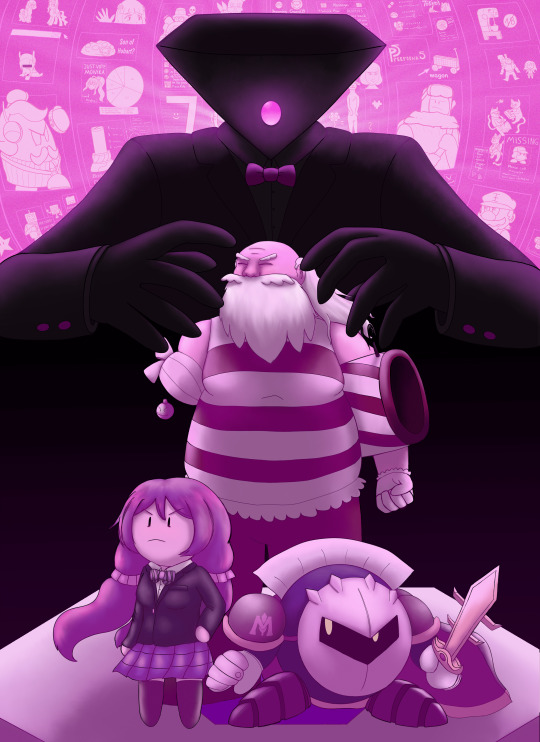
A looming presence... (A piece of fan art for Episode 11 of the Christmas Comeback Crisis)
Read more for an essay on all the memes and references ;)
So here it is. Finally. Only one month too late: This piece of CCC fan art I've worked on since the episode came out.
Sorry for the delay, but I just started at my new job this week and it's been a little stressful, so I didn't have much time to work on this. But now it's finally here!!! I gotta say, the hardest part by far was the background, lol. I didn't mean for it to escalate that much. At the end I was honestly running out of memes to draw.
I bet we can all agree that episode 11 of the Christmas Comeback Crisis was so worth the wait, right???? My god. Peak entertainment. I still can't believe I'm getting all this awesome lore and music for free, feels kinda criminal.
I'm so invested in this story, it's unreal. I can't wait to see how it will end. I can already tell it's gonna be pretty emotional. (And not to alarm anyone, but I have a slight feeling that the Voice is not gonna make it out of this story arc alive. I mean, after everything he's done, it's safe to say that he kinda deserves it. Of course I really don't want him to die, cause that would mean…….. Woodman would also have to die??? Otherwise the Voice will just keep coming back again and again because Woodman is keeping his memory alive…….. Oh man wait a moment….. I don't even want to think about that. Forget I said anything about this.)
Anyway, let's talk about this piece of art for a moment.
In the foreground, we have our brave protagonists. I really really like how Nozomi turned out, so I decided to make her my new icon from now on. Don't get me wrong, I love my old icon, but it's kinda zoomed out and you can't really make out any details when it's really small. So Nozomi it is. Meta Knights sword was shockingly difficult to draw, especially because I had to figure out how to draw it when he's holding it at an angle like that. Otherwise, drawing him was actually one of the easiest things about this whole thing. His design is really just two circles with some arms and armor. Figuring out how the circle tool in Gimp works has never felt this good. (Kinda crazy I can just draw him like this now, considering how obsessed with him I was when I was about 12-13 years old. Back then you had to download official renders of your favorite characters onto your computer, then print them out and hang them on your walls all around your room. Yeah I've always been like this.) Drawing Santa was really fun too, just his right hand was a little difficult. But that's just because I still can't draw hands in general. Maybe I should practice drawing hands more. (Naaaaaah I'm just kidding, I'll never do that.) Now that I'm looking at him again, he's also longingly staring at President Haltmann in the background. Doomed yaoi fr.
Speaking of the background, let's talk about that next. There's obviously the title-giving "looming presence" the Voice. I had his hands completely in the background at first, but I thought it looked cooler when they were hanging threateningly around Santa's shoulders. (You may ask yourself, 'man these hands look kinda alright for my usual hand drawing standards', and that is because I traced over pictures of my own hands. I love "cheating" at art.) I also gave him his stupid little bow tie and the colored buttons on his suit sleeves. Not only is that kinda my trademark for drawing him at this point, it's also supposed to show, that under all the threats and the evil villain persona, he's just kind of a loser. A real (male equivalent of a) girlfailure. That's why I made sure that half of the things shown in the background are there to make fun of him a little. I love the Voice dearly, but that's just what felt right.
And now let's get to the actual main course of this essay. I probably spent half the time working on this on the freaking background. I'm just gonna start in the top left corner and then go down each column and explain what each of these mean or what they reference. (Since there are some quite obscure ones in there.)
Let's start with the two ponies in the very top left. They're actually ponysonas of Nozomi Tojo (left) and Takane Shijou (right). Nozomi is an earth pony and has a tarot card as her cutie mark, specifically the ace of cups. Takane on the other hand is a unicorn and has some musical notes as her cutie mark, which you can't really see. I don't know enough about the Idolmaster to think of something more meaningful for her, sorry. ;)
Under that are Susie Haltmann and her father, President Haltmann. They were (after Woodman) the first characters I wanted to draw into the background. Susie has this black bar covering her face, since she was never really there to begin with. The whole story line with her father wanting to bring her back was actually so freaking sad. And when the Voice killed him in episode 11 and that image of Susie flashed on screen as the last thing he saw before he died….. Oof……… That's also why I drew that cursor looming next to her "window" about to click on the closing button. Haltmann himself is also the only character in the background to actually leave his little window, wanting to reach his daughter. He's also glaring at the Voice for causing him all of this grief and anger in the first place with his false promises.
Then there's…. ahem, "Hot robots in your area". With drawings of a random unnamed robot and Mettaton from Undertale. Which the Voice has apparently bookmarked. This is just a head canon, but I like to think he has a thing for robots, lol. ;)
Oh and on the left next to that on the very first column is Simpleflips' logo. Shoutouts to Simpleflips indeed.
Onto the next column. At the very top is Haruka Amami (also from the Idolmaster), who played a pretty huge role in the CCC, especially in the latest episode. That moment at the very end where she saved Grand Dad from certain death was just fantastic. Absolutely goated scene. She's kinda pressing her face against the window she's trapped in. I hope you can even see that from far away, haha.
Under that is one of the more obscure references. It's from a King for Another Day video, specifically one titled "The Hobart Hootenanny - SiIvaGunner: King for Another Day". It's a slideshow made of beautiful Hobart pictures. One that struck me personally the most was a little family picture of Hobart and the rapper Eminem, who was also a contestant in the KfAD tournament, looking lovingly over their son sitting in a cradle. Eminem is seen saying "Our son is beutiful". A truly touching photograph indeed. In that same slideshow is also another scene of Hobart together with the Voice, but we'll talk about that one later.
The next one is a reference to the CCC side story "I wanna thank me" and shows a pie chart with the election results that were discussed in that episode. Under the pie chart itself is a little box containing all the different parties and showing their respective percentages. On the left is a poster for the "Poké Poké Literature Party", showing Monika's head with the words "Just vote Monika" at the top of the poster. The words (and Misha.) are scribbled on the bottom, lest we forget that she's not running this party alone. This side story was first featured in the Christmas Comeback Crisis Watchalong in 2020, which was actually the first time I watched the CCC in its entirety. It all went downhill from there. ;)
Then there's the Voice's… thing? Object? Weird apparatus where no one really knows what it does or what its purpose is? Every time we see the Voice sitting in his office, this thing is sitting on his desk right next to him. There's been loads of jokes about its purpose. They've all been made before. I'm not going to repeat them. Only the Voice himself truly knows what this thing does. Probably. Could just be a decorative piece of art.
Then we have something veeeery self indulgent on the next column. It's Aquaman from Megaman 8 (With a not so subtle skull right next to him). You should all know by now that I'm the founding father of the Aquawood ship. And I also have the head canon that Woodman and the Voice are very divorced. Interpret into this whatever you want.
Next to Aquaman is the internets' favorite panel from the web comic Tails Gets Trolled. I fucking love that comic. If you haven't read it in its entirety, I highly recommend doing it. (Though be warned that it contains some pretty heavy topics, many many slurs and a plethora of gore.) Okay, maybe I don't recommend reading it. (Just read it with all of that in mind.)
Under that is a personal favorite joke of mine. It's supposed to be Spotify, with a playlist open that I created some time ago. I called it "Die Pizza Playlist" (Remember that die in German is just "the") which I always listen to when I'm baking my own pizza. Highlights include "Pizza" by Antilopen Gang, "Pizza Heroes" by Lemon Demon (You can actually see the album art for Spirit Phone on the left of the playlist.), "Pizza Pizza Pizza" from the Ratatouille musical and so on and so on. The first song in the playlist is obviously "We like pizza" by the Pizza kids, which is even playing in the image. On the side are two more music artists, at the bottom is the image for the Veggie Tales soundtrack, which also featured a song called "Pizza Angel". And over that is Mitski. I just feel like the Voice would listen to her music. Do not question me on this.
The audience laughs at the funny 7.
On the Voice's left shoulder sits a single green bean. It's flashing you a cheeky grin and a peace sign. While I didn't intend for this to happen, I accidentally referenced my own Woodman birthday gallery art from two years ago, where the bean also sits atop the Voice's shoulder. I know that next to "Yankin'", the bean is one of the most hated memes on SiIva, but I think he's just a silly little guy! :D
Let's head on over to the next column. Seems like the Voice has an incoming call from one of his guards, but he's ignoring it as he has more important things to do, like hovering intimidatingly over Santa Claus.
Next to that window on the right are the Voice's messages. I almost wrote "messanges". That would have been embarrassing, thank god I caught that in time. This is also (yet again) a little self indulgent, since the Voice apparently has the last message he sent Woodman pinned to the very top of his messenger app. His big triangular head is blocking most of it, but since I'm the artist, I can tell you exactly what it says: "Please call me back", which was sent on February 1st 2023, the day "The Disappearance of Woodman" was released. Yeah, I'm still very upset, how could you tell? :( Under that is a message to his trusty pizza guy asking for a pizza with extra cheese.
Next we have two of my favorite memes on the SiIvagunner channel (My absolute favorite being "Funny budots", since I never wrote that down anywhere.), one being Frisk Undertale becoming uncanny and the other one being the goat. I don't really know how to describe the goat, but apparently it was crafted by the same artist who made the stoned fox that's also very popular online?? I may just be stupid, but I didn't know about that until I looked up a reference for the goat. Since it often appears alongside Undertale and Deltarune, many have made the assumption that this is what Asriel would look like in real life. That's why Flowey is there next to it with an equal sign. Whoever drew up that calculation wasn't really sure of their work, which is why they drew a question mark right next to it. Between Frisk and the goat is a little Soul, also from Undertale/Deltarune.
Onto the next column, where I'm dropping very subtle hints that a specific character in this image might like pizza. Or might even be a little obsessed with it. On the left is a list with the contact details of three well known pizza chains, on the very top is Sonic the Hedgehog who just recently became a brand ambassador for Totino's and on the bottom right of this section is a flyer for some kind of pizza sale.
The next window contains my favorite joke of any rip on the entire SiIvaGunner Youtube Channel. "Peepoona 5. Let us shart the pants." Just typing this out is making me die of laughter yet again. (The rip in question is "Our Beginning - Persona 5".) But as you all know, I am very into toilet humor. That's why Aquaman is one of my favorite robot masters. And why I'm such a big fan of Youtube Poop. And why I watch Minion fart gun religiously. But enough of that, you get what I'm trying to say. I love funny poop jokes. That's why this is here.
Oh man. This next one is why I wanted to write this very detailed essay in the first place. A reference so obscure, even I can't find its origin anymore. And believe me, I tried. Thankfully, I took a screenshot of the original comment thread this was based on. A user called "The New Guy" commented on a SiIvaGunner rip, something along the lines about how much they enjoyed this specific rip. At the time, the comment had 920 likes, so I'm guessing it must have been a pretty popular video. (The comment should also be about 4 years old now?) Anyway, under that comment, someone asks them what their profile picture was from. They simply answered "wagon", since that was exactly what their profile picture showed. Someone on the SiIvaGunner team must have found this exchange so funny that they commented "wagon" as well. And that's the origin of this joke. If anyone knows which rip this is from pleeeeaaaase tell me. I need to know.
I don't think I need to explain who the next guy is. Just the love of my life. I specifically drew Woodman in his getup from the Nuclear Winter Festival, since that was the last time he appeared on the channel. He's looking kinda concerned in the general direction of the viewer, for obvious reasons. And right under him is his trademarked >:] emoji.
And last but certainly not least, the final column! Now I finally get to talk about this other scene from the Hobart Hootenanny. It shows Hobart and the Voice having a romantic stroll at a beautiful beach, while the sun is slowly setting in the background, making the water shimmer with its breathtaking colors. Okay, the last thing didn't really happen, since it's a shitty MS Paint drawing, but I like to imagine it did. Maybe I should draw a remake of this image one day. Now I'd like to quote the video in question: "A man and Hobart were walking together on the beach. He looked back and saw that in his times of sadness and need, there was only one set of footprints. He asked Hobart why he would leave him in his time of most need. Hobart simply turned to the man and said, VVVVVRRRRR SRRRRR RRRRGGGHHHH--" (Thank you SiIva Wiki for the transcription.) Now I don't think I need to explain why I drew Hobart in a bikini top and fishnets. The question answers itself.
The next image is actually quite easy to explain. It's mm5charge and smol Maki. In another universe, Chargeman and Maki might have been integral to the SiIvaGunner lore. This specific image is just stolen from my piece of fan art called "Megaman 5 Brainrot (featuring Acidman)", which I posted in 2022. I still head canon that Megaman and Love Live take place in the same universe. Just because I think it's funny. And because I want to see funny robot masters interact with the girlies from Love Live. How do I explain this? It's like…. balancing out the world? The robot masters are almost all male (with a few exceptions) and the characters shown in Love Live are all female. How would Thanos say? "Perfectly balanced, as all things should be." Don't question my cool head canons, okay?
After that we have a poster featuring the Jazz Cats! I really really love the little animations that showed their backstory when KfAD2 first came out. I don't know if it's okay for me to say this, but I also really really enjoy the song "But Not You" written (in universe) by Doge and Naxx. The text is veeeeeeery questionable, but man, does it sound good regardless… And shoutouts to wolfman1405 for the heavenly vocals.
On the right of that is a missing poster for Wade L.D.. Nothing much to explain here I guess.
Left of that is the Voices shopping list, which lists flour, oil, yeast… Wait a minute…. All of these are ingredients for pizza dough! Guys, I'm beginning to think that this guy might like pizza.
On the very bottom of this column is Mario 7 Grand Dad himself, who has his hostile gaze directed at the Voice. I would be pissed off too if someone kept me locked in a glass tube for 7 years.
The last little window just shows the Vineshroom with the words "fecal funny" written under it.
And with that, it is done. The entire background thoroughly explained. (I may have gone a little overboard this time.)
It's been a while since I posted new art, huh? In the meantime, a lot has happened. As I said before, I started a new job, got a tattoo of Woodman on my leg (best idea I've ever had btw) and I also started watching MLP, which explains the Love Live / Idolmaster ponysonas, lol.
And that's all I wanted to say. I hope that the next piece of art isn't that far off. Jenny out. (I think this might have been the longest essay I've ever written here. I'm so sorry. By which I mean, I'm not sorry at all. I'm not forcing anyone to read this.)
#welp im one month too late#but better late than never#i put my giant ass essay under the read more this time#open with caution its extremely fucking long because i got a little carried away#siivagunner#the voice inside your head#santa claus#nozomi tojo#smol nozomi#meta knight#president haltmann#susie haltmann#thats it im not tagging all of these guys#christmas comeback crisis#if you saw this posted to the wrong blog no you didnt#jumpscaring kirby fans with siivagunner art is my favorite hobby
29 notes
·
View notes
Text
You have not experienced depression and this chapter proves it to me
I'm going to sound harsh but there are two camps of readers for this chapter: those who complain that the story is slowing down in a negative way, that we are witnessing yet another emotional crisis of Asa, on the other hand those who see themselves in Asa or at least conceive this chapter as the logical continuation of her emotional arc.
I wouldn't say who is right or wrong: the pace of the story does slow down. But several things. Forget part 1, you were following another protagonist, completely inhuman (in a self-destructive way) locked in a hellish system. Now you follow a high school girl with the war demon in her gut, even if super-powerful demons show their face, the story has changed setting. We are no longer crushed in a system, where the logic is that of abnormality: characters who die quickly, and those who survive were completely crazy. Here you are faced with the opposite pattern: it is in normality, the so-called normality, that abnormality and horrors slowly and more deeply begin to appear.
Asa is trapped in a vicious circle of self-deprecation, of lack of confidence, what "these repetitions" prove to you is that every time she initiates something, dabbles in happiness, simply loves someone: from a friend to an animal, it ends irreparably bad and in the worst way.
You are faced with a high school girl who does not evolve. Why is that? Because she refuses to move on. But the demon that represents rage and warriors is nestled inside her. Don't read this chapter as the umpteenth time Asa has a temper tantrum. But a young girl who is first of all undergoing what her opponent is serving her as an appetizer: the taste of trauma, the soup.
I don't know if I'm wrong, but in my opinion, forcing Asa and Yoru to cooperate and not let one of them take the upper hand over the other allows one thing: for the war to understand that it can be done otherwise than by enslavement, and for the girl to understand that even a demon nestled in her void.
Is a form of company.
And that she can no longer be alone.
153 notes
·
View notes
Text
How Would I Write A Batman TV Series
Hello! So I'm a huge fan of Batman. He's been my favorite superhero since I was five and one of my favorite movies of all time is The Batman (2022). So as a writer of course I've had ideas about a Batman TV series (animated or live action). It would be werid if I haven't thought about it. Now I doubt I'll ever actually get to make that idea a reality but it's the thought that counts!
Back when I first came up with the idea for this hypothetical series I actually wrote part of a script for it. It's just first and last scene of the episode but it counts for something. It was the first time I had written in screenplay format and I haven't done it since so It's most likely a little rough but my thought process behind all of it was simple.
Here is the last scene of the hypothetical first episode. The Wayne Murders.



Why is this the last scene?
I wanted to be different. In a lot of Batman stories the story kicks off with the death of Thomas and Martha Wayne. So having the first episode end with their deaths seemed fun. I wanted the viewer to spend time with the Wayne's before tragedy struck.
Why is Selina Kyle there?
I was inspired by the show Gotham's take on the Wayne Murders, where Selina Kyle was actually present for them. I thought it would be cool to have Selina and Bruce be duo protagonist of the series. Throughout this first episode we are not only following Bruce but we are also following Selina. I wanted to parallel them in cool intresting ways.
We see the difference between them and how they live. Bruce is a sheltered and carefree while Selina has seen far to much for some one her age. Bruce is the son of a wealthy family while Selina is the daugther of a family living in poverty who has to steal to survive. Bruce has a happy loving family and Selina doesn't.
Bruce wears pristine fashionable clothes his parents bought for him while Selina's clothes are more run down and worn. Bruce goes to a private school and Selina goes to a public one. Bruce has a circle of close friends while Selina has her little sister and stray cats she feeds
Even the lightning of their scenes would be different. Selina's would be cold and dark while Bruce's would be warm and bright. Selina is in closed spaces while Bruce is in open ones.
They have nothing in common until one day Bruce and his parents step foot in a dark, cold alley way. Then suddenly they have a lot in common while still being different in so many other ways.
Now on to the first scene which I never finished writing.


Now I don't have much for this scene. I wanted it to be clear throughout the episode that Thomas is worried about something or is working on something beacuse I thought it would be a cool set up for the Court of Owls. And that's it. That's why this season exists. Told you I didn't have much.
That's all for now. We'll talk about this again whenever I decide to work on character arcs and villians.
10 notes
·
View notes
Note
I have a rant for you when you get further along in dragon age, I'm pissed.
I'm like lvl7 and still in Haven. The world is too big. I haven't left the first starting area yet. I keep unlocking new areas from the war room but too overwhelmed to go dip my toes in them yet. Idk what I'm doing, man. I'm losing approval left and right what's happening these missions never fucking end
At least Vivienne seems to like me and the choices I make. Roleplaying the protagonist as a snobby noble is a fun idea, they said. Think of all the character development potential they said. It will get you mad puss they claimed. Well now Sera doesn't wanna fuck me as much, Blackwall is a goddamn bore who got pissy when I said "I enjoy being worshiped" as if my protag isn't literaly the second coming of christ! Cullen is a fuckboy without the fuck, why did he stutter when I mentioned celibacy and blush like a maiden? also why the fuck would anyone tries seducing someone else by the mention of celibacy vows? The protagonist rizz game is atrocious but thankfully everyone is too distracted by the perfect tits and pretty face to notice.
Casaandra is still going strong ngl she's mad cool, all romance scenes have been W after W after W. She also doesn't mind my character's god complex and I think she might be down to join the overzealous worshippers fanclub if I play my cards right.
I also forgot Solas's entire existence and got jumped scared by him while picking herbs around the camp. I forgor I stripped him from all of his armour and weapons, left him in his PJs amidst a snowy mountian hill bc I parked him permanently outside a hut the second Vivienne joined my party. How come they're both bald is it like a great mage requirement or a new fashion trend amdist the circles
I got a horsey at least, that's fun
Anyway is there a cult ending or something if there is I think I want the cult ending. At first I was one the fence about claiming to be the herald of Andraste bc I don't remember what tf happened in that pit. But now I'm down with it, like yeah sure, I'll be your Joan of Arc, I'm the chosen one. Actually Andraste herself came down from the heavens and let me suckle on her tatas which granted me this powers. I am the Prophet, I am the Maker's favourite little human, Obey me. Worship me. Pay me. They should establish new churches in my name.
a cult harem would be nice, a throne too, some long robes would be cracker ngl
Are those people french btw?
8 notes
·
View notes
Note
I think Sunny would be a better protagonist if he spoke. The only reason given for his silence is that he doesn't like to talk much, but even introverted, quiet people are not dead silent in every situation. It actively harms his character, too. There are moments where Sunny having dialogue would've done a better job of conveying what emotion the creator was trying to get across. Like when Sunny finds Basil having a mental breakdown in the bathroom and the former just leaves him there without a saying a word. During this moment, Basil says "Sunny... W-Why... Why do you look so scared?", so Omocat was trying to show that Sunny was afraid to talk to Basil.
However, Sunny's "fear" is poorly conveyed because when you click on the mirror, he still has his usual expressionless face. Instead of coming off as scared, Sunny comes off as an uncaring jerk.

no no no you see his fear is actually conveyed by his complete lack of a reaction which is a clear sign of PTSD and flat affect and you're just not mentally ill enough to grasp the game's intricate nuances anyway (/j but that, in fact, was an argument of some fans I came across and talked with. I wish I was kidding.)
I think Sunny would be a better protagonist if he spoke. The only reason given for his silence is that he doesn't like to talk much, but even introverted, quiet people are not dead silent in every situation.
Yeah. As I've said in this post, Sunny's lack of a distinctive personality makes it come across as less of an organic personality trait and more as the writer's excuse for keeping him silent until the game's very last seconds to maximize the scene's emotional impact (doesn't stop him from using his voice for pizza deliveries, though. internal consistency 👍)
IMO he could've talked akin to OFF's The Batter - generally terse and direct. It would've complimented Sunny's stoic disposition while also giving him a real way to express himself beyond the constant resting bitch face. Alternatively, he could've kept silent on his first day in the town but become more talkative as the game progressed to indicate his growth. I also thought of making his arc the opposite of Omori's - the more Sunny changes and grows, the more irascible and petulant Omori becomes to his friends.
There are moments where Sunny having dialogue would've done a better job of conveying what emotion the creator was trying to get across. Like when Sunny finds Basil having a mental breakdown in the bathroom and the former just leaves him there without a saying a word.
Basil's overworld sprite doesn't even make him look like he's having a breakdown. And you're given the option to run circles around him like it's no problem. truly peak
Seriously, though - there were so many ways to convey Sunny has no control over the situation. Make him unable to go in any direction but directly to Basil, have the latter say his "you look scared" line and give the player some ominous fake choice prompt like
Leave. Yes/Yes
And that's it! The cutscene could've been at least slightly spooky with just a little bit of thought! Which, of course, was never the priority. Feels before reals :)
12 notes
·
View notes
Text
How to Write a Unique Story in Four Easy Steps
Pick a Plot: Any story starts with a plot...or a half-ass idea depending on what you're going for. This is always step one. At this stage, you don't need characters at this point in time. No characters are relevant. Why? Because how can you have a character if you don't even know where you are going? Sometimes when you make characters first and then introduce a plot, halfway in you may notice things aren't working out with the character and you may have the urge to change them or just scrap the story entirely. Start with what you want over who should star in it. Where is the endgame? Basic outline, how do we get there? What brings us to Point A to Point B to Point C? Climax? Ascending moments? Descending moments? Where do things become better or worse? If you don't know, we won't and while I'm up for surprises, sometimes not knowing yourself until a random reveal isn't the same as a planned one and can detract from the end product far too much.
2. Pick a Setting: Earth? Random planet? Environment? Language around those areas? Where are we going to be? Where do you want to take us? What do you want us to see? Now that you have a basic plot, you should prioritize next tweaking it to a setting. Where would that plot blend to its environment? How will it interact with it? Are you moving around constantly where it doesn't matter or is it a relatively stable area where a majority of the plot happens?
3. Character Creation: You have a plot, you have a setting, now...who can do what you need them to do and how? Creating the character after the heavy details of plot and setting is actually easier than the opposite. May not seem like it but is. Now I know where we are and what we're doing, who is the protagonist? Who is their antagonist? Who interacts with the story, who helps or destroys? Who do we want to see interact with all this? Go nuts but be mindful of your limitations, what limits this world of yours has, and who should stay in the inner circle of focus to progress that plot further. Keep in mind, your setting and language is crucial to skin color and culture, especially if you're emphasis is in a real area on Earth. Alien? Not so much.
4. The Tight-Knit Details: You have plot, settings, and characters. Now, the little things that interact with all three. Relationships? Not just romantic but platonic and families too. Is there any hobbies about? Do you want specific vehicles, weapons, artifacts, or knowledge? What clues can you put in to hint at maybe something isn't adding up throughout the story how a character's arc is going? This is actually the most time consuming and honestly, some people have luck making stuff up as they go (don't do that if you're basing it on real cultures though...research is very appreciated) and others need the finest details to move forward. Details are sometimes the keys to opening doors to move along the plot down the road even if they are stupidly mundane. They will change how characters interact with the plot and settings sometimes so be aware of that.
If you can master these four steps, you should be on the right track to making your very own story, long or short.
Now, what about fluff/nsfw/one-shots/etc? Different rules.
Character Creation: A given first because this isn't a story you're writing. This is actually just deciding between canon media characters, OC and canon, or OC and OC, but it's nice to know who you are starting with.
Pick a Plot: What are we doing with these characters? Shipping? Drama? Angst? Something you will never tell your parents even in death? Pick a plot, any plot you want, any plot you want to see happen...go for it. Remember, someone somewhere has thought of the same thing, alright? It just the difficulty of writing what you want to see that makes you hesitant and I can't blame you.
Pick a Setting: Honestly, unless the plot is specific to the environment, not that important. Choose just about wherever you think works best for the situation or a pre-made setting if it features characters from shows, movies, etc.
The Tight-Knit Details: Mmm, anything specific about the characters or what their doing? Positions you would like to see? If you have questions about canon characters, a little research or wing it. I don't think anyone's going to make that big of a fuss about it. It's your creation. Do whatever you feel like. The only thing I recommend is understanding limits of certain details like if you're writing them, you know, being together, what position, how does that character prepare for the encounter, what leads up to it if at all, or what are the physics of the limits of the bodies, of the species or whatever? It's little details like that that keep it realistic enough for us to read it without hassle in understanding what's happening but not constricting to any situation you want your characters to be in.
#creative writing#my writing#ao3#ao3 fanfic#fanfiction#tigressa talks#informative#what I was taught for better or for worse
6 notes
·
View notes